

Visa & Entry Requirements
All visitors to Namibia must have a valid passport for at least six months after the date of entry, and have sufficient pages for entry and exit stamps (at least three blank pages for the entry and exit stamps). All visitors must also have a valid return ticket. In addition, all visitors must have a visa, except those nationalities with which Namibia has the necessary visa exemption agreement.
Visitors from the following countries do not require visas:
Angola, Armenia, Australia, Austria, Azerbaijan, Belarus, Belgium, Botswana, Brazil, Canada, Cuba, Denmark, Eswatini, Finland, France, Germany, Hong Kong, Iceland, Indonesia, Ireland, Italy, Jamaica, Japan, Kazakhstan, Kenya, Kyrgyzstan, Lesotho, Liechtenstein, Luxembourg, Macau SAR, Malaysia, Malawi, Mauritius, Moldova, Mozambique, Netherlands, New Zealand, Norway, Portugal, Russia, Seychelles, Singapore, South Africa, Spain, Sweden, Switzerland, Tajikistan, Tanzania, Turkmenistan, Ukraine, United Kingdom, United States of America, Uzbekistan, Zambia, Zimbabwe.
Visitors from the following countries can apply for a visa upon arrival in Namibia:
Argentina, Belarus, Cambodia, Chile, Equatorial Guinea, Benin, Cape Verde, Croatia, Eritrea, Bulgaria, Cameroon, Comoros, Cote d’ Ivoire, Gabon, Burkina Faso, Burundi, Central African Republic, Chad, Czech Republic , Djibouti, Ecuador, Estonia, Greece, Gambia, Guinea, Guinea Bissau, Mexico, Romania, Slovakia, Hungary, Israel, Latvia, Lithuania, Moldova, Rwanda, South Korea, Liberia , São Tomé and Principe, Thailand, Madagascar, Nicaragua, Niger, Sierra Leone, Togo, Turkey, Mauritania, Paraguay, Peru, Poland , Tunisia, Uganda, Ukraine, United Arab Emirates, Uruguay, Venezuela, Vetican/Holy See, Vietnam and Western Sahara Republic.
It is recommended that travellers planning on visiting Namibia always confirm whether or not a VISA is required. This is because the above lists may change from time to time.
Holidaymakers and tourists are welcome to remain in the country for 90 days. Business visas are granted at the discretion of the immigration authorities. Travellers can obtain visas from the Ministry of Home Affairs, Immigration Safety and Security, and Namibian missions abroad. Please note that a visa on arrival is only issued at Hosea Kutako International Airport, Walvis Bay International Airport, Walvis Bay Harbour, Trans-Kalahari border post, Impalila Island border post, Katima Mulilo border post, Oshikango border post, Mohembo border post, Ariamsvlei border post, Orangemund border post, Noordoewer border post and Ngoma border post for selected countries and it is meant for tourist purposes only. Any other traveller with a different entry purpose must submit their application with all relevant documentation to the appropriate office.
Visas are valid up to three months from the date of issue for stays of up to three months from entry. Extensions for a further three months are available from the Ministry of Home Affairs in Windhoek.
Temporary Residence Permit:
Apply to the High Commission or Embassy; see Namibian Ministry of Home Affairs, Immigration, Safety and Security’s website.
Information pertaining to applicable fees are available on the Ministry of Home Affairs, Immigration, Safety and Security ‘s website.
Communication:
Travellers to Namibia can travel with mobile equipment and access the GSM network at all towns and on most portions of the national highway. International roaming agreements are in place with 146 countries through 334 network partners.
Most accommodation establishments in Namibia offer Wi-Fi to their guests. For self-drive travellers who plan to travel into remote areas, it is recommended that they rent a satellite phone. When dialling internationally from Namibia via mobile devices, a + followed by the relevant country code, area code and number is dialled. For example, when dialling internationally to Namibia, the country code is 264, followed by the area code and number.
MTC and TN Mobile are Namibia’s leading cell phone operators. Travellers can purchase a starter pack and data if they want to communicate with other Namibian cell phones. Additional data can be bought easily across Namibia.
If visitors to Namibia have a tourist/holiday visa, they cannot engage in any employment while in the country. Should they wish to do so, they should apply for an employment permit in their country of residence before entry. The same applies to study permits.
NTB Newsletter
Signup to our newsletter.
This will close in 0 seconds
Privacy Overview
Update April 12, 2024
Information for u.s. citizens in the middle east.
- Travel Advisories |
- Contact Us |
- MyTravelGov |
Find U.S. Embassies & Consulates
Travel.state.gov, congressional liaison, special issuance agency, u.s. passports, international travel, intercountry adoption, international parental child abduction, records and authentications, popular links, travel advisories, mytravelgov, stay connected, legal resources, legal information, info for u.s. law enforcement, replace or certify documents.
Before You Go
Learn About Your Destination
While Abroad
Emergencies
Share this page:
Travel Advisory November 27, 2023
Namibia - level 2: exercise increased caution.
Last Update: Reissued with updates to crime.
Exercise increased caution in Namibia due to crime .
Country Summary : Petty crime, such as pickpocketing, purse snatching, and "smash-and-grab" attacks on vehicles, is increasingly common, and these can violently escalate into robberies and muggings. There is a higher risk of crime in the central business districts of major cities after dark.
Read the country information page for additional information on travel to Namibia.
If you decide to travel to Namibia:
- Avoid walking alone, especially after dark.
- Do not display large amounts of cash or other valuables.
- Keep car doors locked and windows shut at all times.
- Be cautious of people appearing to request assistance by the side of the road.
- Use ATMs located in well-lit public places or inside a bank or other business and be cautious of anyone offering assistance in using the ATM.
- Always carry a copy of your U.S. passport and Namibian visa or entry stamp (if applicable). Keep original documents in a secure location.
- Enroll in the Smart Traveler Enrollment Program ( STEP ) to receive Alerts and make it easier to locate you in an emergency.
- Follow the Department of State on Facebook and X .
- Review the Country Security Report for Namibia.
- Prepare a contingency plan for emergency situations. Review the Traveler’s Checklist
- Visit the CDC page for the latest Travel Health Information related to your travel.
Embassy Messages
View Alerts and Messages Archive
Quick Facts
Not required for stays of 90 days or fewer per calendar year
Yellow fever, if traveling from a yellow fever endemic country
Not applicable
Embassies and Consulates
U.s. embassy windhoek.
14 Lossen Street, Ausspannplatz Windhoek, Namibia Telephone: +(264) (61) 295 8500 Emergency After-Hours Telephone: +(264) (61) 295 8500 Fax: +(264)(61) 295-8603 Email: [email protected]
Destination Description
Learn about the U.S. relationship to countries around the world.
Entry, Exit and Visa Requirements
Requirements for Entry:
- Passports must have at least six months of validity remaining beyond your planned date of departure. At least three completely blank pages are required for entry. If you are traveling with minor children to Namibia, be aware that additional documentation is required.
- Tourists visiting Namibia for fewer than 90 days per calendar year are not required to obtain a visa in advance of their arrival. All other visa types (e.g., student, work, volunteer, etc.) must be obtained from the nearest Namibian embassy or consulate before travel. Visit the Namibian Embassy’s website for the most current visa information.
- Upon arrival, check your admission stamp before leaving the immigration counter to ensure that the stamp is valid for the length of your intended stay (up to 90 days) or transit through Namibia and that immigration officials have given you a correctly dated entry stamp, as this stamp will be checked upon departure. Overstaying the time granted or having an incorrect or missing entry stamp can result in detention, arrest, and fines.
- Travelers to Namibia are not required to produce a negative SARS-CoV-2 PCR test result or proof of vaccination.
- World Health Organization (WHO) card with yellow fever vaccination if traveling from a yellow fever endemic country. Check the CDC Yellow Book for further information.
Parents traveling to Namibia with minor children should be prepared to produce unabridged birth certificates for their children demonstrating their parental relationship. Birth certificates should be original or certified copies of the original. When one parent is traveling alone with a child, he or she should present the unabridged birth certificate, plus a notarized consent from the other parent listed on the birth certificate authorizing him or her to enter/depart from Namibia with the child. Alternatively, the parent could also present a court order granting him or her full legal custody of the child, or the death certificate of the other parent named on the birth certificate.
The U.S. Department of State is unaware of any HIV/AIDS entry restrictions for visitors to, or foreign residents of Namibia. Find information on dual nationality , prevention of international child abduction , and customs regulations on our websites.
Safety and Security
Road Travel: Namibia has thousands of miles of unpaved roads. Road accidents, particularly on gravel roads, pose the most serious threat to visitors. Many gravel roads are well-maintained and can provide unaccustomed drivers a false sense of security, with road conditions shifting dramatically in certain areas. See recommendations below on road safety in Namibia.
Crime: Non-violent crimes of opportunity are the most common incidents reported by foreigners and include pick pocketing, purse snatching, ATM card skimming, and vehicle thefts and break-ins. Criminals sometimes brandish knives and guns. Violent crimes, including murder and rape, and property crimes increased in Windhoek over the last year. Robberies occur at roadside rest stops.
- Dress conservatively.
- Avoid walking alone, especially after dark, and displaying cash and valuable personal property.
- Make sure your hotel room or residence is well secured, including windows.
- Keep your credit card in your sight at all times while it is being processed. Consider using prepaid credit cards with limited funds when traveling.
- Take rest breaks in towns and/or at gasoline stations.
Transport crimes: Violent assaults on taxi passengers are known to occur; petty theft is prevalent and occurs on trains, buses, and in taxis.
- Be aware of criminals using remote key fobs to unlock vehicle doors in parking lots.
- Drive with doors locked and windows closed.
- Keep valuables out of sight and do not use cell phones or laptops while stopped in traffic; bandits may use smash and grab tactics to steal valuables.
- Hire taxis through a hotel or retain the services of a reputable private transport company.
Checkpoints: The police maintain checkpoints approximately 9 miles (15 km) outside of main cities and all major highways. During the holiday season, additional checkpoints may be established along the Windhoek-Swakopmund highway (B1).
- Remain inside your vehicle with doors locked and open the window slightly to communicate.
- Be prepared to produce vehicle registration documents, personal identification (passport, Namibian identification cards), car rental contracts, and/or drivers’ licenses.
- Proceed only when waved through.
International Financial Scams: See the Department of State and the FBI pages for information.
Victims of Crime: U.S. citizen victims of sexual assault are encouraged to contact the U.S. Embassy for assistance. Report crimes to the local police at 112 and contact the U.S. Embassy at + (264) (61) 295-8522.
Tourist Protection Units (TPUs) assist tourists victimized by crime in Windhoek and Swakopmund.
Please contact:
- Tourist Protection Unit – Windhoek (Windhoek Main Police Station) at + (264) (61) 209-4345 or + (264) (81) 615-4401.
- Tourist Protection Unit – Swakopmund at + (264) (64) 415-060.
- The Motor Vehicle Accident Fund at 081 9682 can help with ambulances, police, and rescue services.
Local authorities are responsible for investigating and prosecuting crime.
See our webpage on help for U.S. victims of crime overseas .
We can:
- Help you find appropriate medical care
- Assist you in reporting a crime to the police
- Contact relatives or friends with your written consent
- Explain the local criminal justice process in general terms
- Provide a list of local attorneys
- Provide our information on victim’s compensation programs in the U.S.
- Provide an emergency loan for repatriation to the United States and/or limited medical support in cases of destitution
- Replace a stolen or lost passport
Domestic Violence: U.S. citizen victims of domestic violence are encouraged to contact the Embassy for assistance.
Tourism: The tourism industry is unevenly regulated, and safety inspections for equipment and facilities do not commonly occur. Hazardous areas/activities are not always identified with appropriate signage, and staff may not be trained or certified either by the host government or by recognized authorities in the field. In the event of an injury, appropriate medical treatment is typically available only in/near major cities. First responders are generally unable to access areas outside of major cities and to provide urgent medical treatment. U.S. citizens are encouraged to purchase medical evacuation insurance .
Local Laws & Special Circumstances
Criminal Penalties: You are subject to local laws. If you violate local laws, even unknowingly, you may be expelled, arrested, or imprisoned. Individuals establishing a business or practicing a profession that requires additional permits or licensing should seek information from the competent local authorities, prior to practicing or operating a business.
Furthermore, some laws are also prosecutable in the United States, regardless of local law. For examples, see our website on crimes against minors abroad and the Department of Justice website.
Diamonds: Do not purchase diamonds and other protected resources outside of licensed retail establishments. If you are convicted of illegally dealing in diamonds, you can face up to 20,000 U.S. dollars in fines and/or five years in prison.
Wild animal parts: Unlicensed purchase of or trading in endangered wildlife parts, such as ivory and rhino horn, is illegal and carries severe penalties including fines up to 1.1 million U.S. dollars and 15 years in prison. Furthermore, it is illegal to kill or capture any protected wild animals without appropriate permits.
Arrest Notification: If you are arrested or detained, ask police or prison officials to notify the U.S. Embassy immediately. See our webpage for further information.
Photography: It is illegal to take pictures of government buildings, military installations, and key infrastructure, such as ports, train stations, airports, and along border areas. You could be fined, have your photographic equipment confiscated, and risk detention and arrest. Do not take photos of people without their permission.
Phone Service: Cellular phones are the norm, as landlines are only in urban areas. It is possible to purchase a SIM card locally and use a U.S.-compatible cell phone.
Currency: The Namibian dollar (NAD) is the official currency. It is pegged to the South African rand, which is also legal tender in Namibia. Carefully inspect ATMs for skimming technology before using. Credit cards are generally accepted.
Wild Animal Parks : Heed all instructions given by guides or trackers. Use common sense and maintain a safe distance when approaching wildlife. Even in the most serene settings wild animals pose a lethal threat. Lions, leopards, elephants, oryxes, rhinos, hippos, and crocodiles have critically injured and killed individuals in the region.
Baboons live throughout Namibia and commonly scavenge the belongings of travelers. Baboons in camping areas are quite bold in approaching and taking items that interest them; they can be aggressive. Keep your belongings and food in secure containers.
Counterfeit and Pirated Goods: Although counterfeit and pirated goods are prevalent in many countries, they may still be illegal according to local laws. You may also pay fines or have to give them up if you bring them back to the United States. See the U.S. Department of Justice website for more information.
Adventure activities: Climbing areas, 4X4 trails, hiking trails, and rivers are unpredictable and dangerous. They are often located in isolated areas without access to communications and away from any medical assistance. Dozens of people, including U.S. citizens, have been injured or drowned.
- Leave a copy of your identification, travel documents, and an itinerary with the hotel reception desk when you go on excursions to assist police/rescue teams in the event of a problem.
- Bring sufficient water and supplies, including a satellite phone preprogrammed with emergency numbers.
- Provide a detailed travel plan and return date to family and friends in the United States before your excursion.
Faith-Based Travelers: See our following webpages for details:
- Faith-Based Travel Information
- International Religious Freedom Report – see country reports
- Human Rights Report – see country reports
- Hajj Fact Sheet for Travelers
- Best Practices for Volunteering Abroad
LGBTQI+ Travelers: Homosexuality is not illegal but sodomy between men is criminalized, though the ban is not enforced. Many Namibians consider all same-sex sexual activity taboo.
See our LGBTQI+ Travel Information page and section 6 of our Human Rights report for further details.
Travelers with Disabilities: The law in Namibia prohibits discrimination against persons with physical, sensory, intellectual or mental disabilities, and the law is enforced. Social acceptance of persons with disabilities in public is as prevalent as in the United States. The most common types of accessibility may include accessible facilities and information to services. Expect accessibility to be limited in public transportation, lodging, communication and general infrastructure. Contact the US Embassy in Namibia to receive a list of providers.
Students: See our Students Abroad page and FBI travel tips.
Women Travelers: There are frequent reports of rapes, particularly in informal settlements. Only a small fraction of rape cases are prosecuted and fewer still result in conviction. Gender-based Violence Protection Units intervene in cases of domestic violence, which is widespread. Units are staffed with police officers, social workers, legal advisors, and medical personnel trained to assist victims of sexual assault. A privately run shelter operates in the Khomas region and there are government shelters in other regions.
See our travel tips for Women Travelers .
Consult the CDC website for Namibia prior to travel.
Medical facilities in the capital of Windhoek and in large towns are capable of providing emergency care and performing many routine procedures. Doctors and dentists are generally well-trained. Well-equipped facilities are rarely available in smaller towns. Carry prescription medication in original packaging with your doctor’s prescription. Be sure to verify with the Namibian Ministry of Foreign Affairs that your medications are legal before you travel.
We do not pay medical bills. Be aware that U.S. Medicare does not apply overseas. Most hospitals and doctors overseas do not accept U.S. health insurance.
Medical Insurance: Make sure your health insurance plan provides coverage overseas. Most care providers overseas only accept cash payments. See our webpage for more information on insurance coverage.
We strongly recommend supplemental insurance to cover medical evacuation.
The following diseases are prevalent:
- Malaria
- Hepatitis A
- Hepatitis B
- Yellow Fever
- Leptospirosis
- Schistosomiasis
- African Tick Bite Fever
- Chikungunya
- Crimean-Congo Hemorrhagic Fever
- Leishmaniasis
- Ross River Virus Disease
- Rift River Valley
- Tuberculosis
Use the U.S. Centers for Disease Control and Prevention recommended mosquito repellents and sleep under insecticide-impregnated mosquito nets. Chemoprophylaxis is recommended for all travelers even for short stays.
HIV/AIDS: The United States works in partnership with the Government of Namibia to fight HIV/AIDS while promoting sustainable national ownership and leadership of HIV/AIDS programs. (Through PEPFAR, USAID and the Ministry of Health and Social Services). PEPFAR is the largest commitment by a single nation towards an international health initiative and in Namibia, PEPFAR has contributed over US$1.1 billion for HIV/AIDS activities since its inception in 2003.
Visit the U.S. Centers for Disease Control and Prevention website for more information about Resources for Travelers regarding specific issues in Namibia.
For emergency services in Namibia, dial Police; +264(63)10111. E-Med Rescue 24, dial 081 924 (from Cell), 061 411 600 (landline); AEMS Ambulance Services, dial 081 963 (from Cell), 061 300 118 (landline).
Ambulance services are:
- not widely available, particularly outside of major cities, and training and availability of emergency responders may be below U.S. standards.
- Injured or seriously ill travelers may prefer to take a taxi or private vehicle to the nearest major hospital rather than wait for an ambulance. Response times for ambulance services could be up to twenty minutes.
Vaccinations:
Be up-to-date on all vaccinations recommended by the U.S. Centers for Disease Control and Prevention.
Further health information:
- World Health Organization
- U.S. Centers for Disease Control and Prevention (CDC)
Air Quality: Visit AirNow Department of State for information on air quality at U.S. Embassies and Consulates.
The air quality varies considerably and fluctuates with the seasons. It is typically at its worst in the Spring. People at the greatest risk from particle pollution exposure include:
- Infants, children, and teens
- People over 65 years of age
- People with lung disease such as asthma and chronic obstructive pulmonary disease (COPD), which includes chronic bronchitis and emphysema;
- People with heart disease or diabetes
- People who work or are active outdoors
The U.S. Embassy maintains a list of doctors and hospitals . We do not endorse or recommend any specific medical provider or clinic.
Health facilities in general
- Adequate health facilities are available in city and other major cities but health care in rural areas may be below U.S. standards.
- Hospitals and doctors usually require payment “up front” prior to service or admission. Credit card payment is not always available. Some hospitals and medical professionals require cash payment.
- Private hospitals usually require advance payment or proof of adequate insurance before admitting a patient.
- Medical staff may speak little English outside of Windhoek, especially in rural areas.
- Patients bear all costs for transfer to or between hospitals.
- Psychological and psychiatric services are limited, even in the larger cities, with hospital-based care only available through government institutions
Medical Tourism and Elective Surgery
- Medical tourism is a rapidly growing industry. People seeking health care overseas should understand that medical systems operate differently from those in the United States and are not subject to the same rules and regulations. Anyone interested in traveling for medical purposes should consult with their local physician before traveling and visit the U.S. Centers for Disease Control and Prevention website for information on Medical Tourism, the risks of medical tourism, and what you can do to prepare before traveling to Namibia.
- We strongly recommend supplemental insurance to cover medical evacuation in the event of unforeseen medical complications.
- Your legal options in case of malpractice are very limited in Namibia.
- Persons traveling to Namibia for medical purposes require the proper “medical” visa. Check the Government of Namibia’s website for more information.
Pharmaceuticals
- U.S. Customs and Border Protection and the Food and Drug Administration are responsible for rules governing the transport of medication back to the United States. Medication purchased abroad must meet their requirements to be legally brought back into the United States. Medication should be for personal use and must be approved for usage in the United States. Please visit the U.S. Customs and Border Protection and the Food and Drug Administration websites for more information.
Water Quality
- In many areas, tap water is not potable. Bottled water and beverages are generally safe, although you should be aware that many restaurants and hotels serve tap water unless bottled water is specifically requested. Be aware that ice for drinks may be made using tap water.
- Many cities in Namibia are at high altitude. Be aware of the symptoms of altitude sickenss, and take precautions before you travel. Visit the U.S. Centers for Disease Control and Prevention website for more information about Travel to High Altitudes .
Travel and Transportation
Road Conditions and Safety: Most major roads are generally well maintained, though many rural roads are gravel and fatal accidents are not uncommon. (The road from Windhoek to Swakopmund is paved, but also the site of many fatal accidents, particularly between Usakos and Arandis). Tourists are often involved in single vehicle roll-over accidents. Sand, salt, and gravel roads become very slippery when wet and more dangerous at night. Animals easily visible by day become treacherous hazards in roadways at night. Do not exceed 45 mph (80km) on gravel roads. Many rental vehicle agencies void insurance policies if an accident occurs while speeding. Tire punctures are common as are accidents involving drunk drivers. Other driving hazards include excessive speed, lack of street lighting and shoulders, inadequately maintained vehicles, erratic driving habits, and pedestrians.
The Embassy does not recommend traveling after dark anywhere outside Namibia’s cities. Travel in desert areas or via the Trans-Caprivi Highway between Rundu and Katima Mulilo should only be undertaken during daylight hours. Carry water, additional fuel, spare tires, and provisions. Fuel availability can be sporadic. Professional roadside assistance outside Windhoek or off main roads is unreliable or non-existent.
Traffic Laws: Traffic drives on the left. You may use a U.S. license for up to 90 days or obtain an international driving permit prior to leaving the United States through either the American Automobile Association or the American Automobile Touring Alliance. It is illegal to use a cell phone while driving. Seat belts are required for all vehicle occupants. Motorcyclists are required to wear protective helmets. You may face a charge of culpable homicide if you are driving and are involved in an accident resulting in death.
Motorcades: Pull to the side of the road as far as possible and promptly follow instructions given by the officials present.
Public Transportation: Public transportation is not widely available outside the capital. Taxis and municipal buses are the only forms of public transportation in Windhoek. Schedules and routes are limited.
Avoid the use of public transportation and hire private transport from a reliable source. Any form of public transportation is unregulated, unreliable, and generally unsafe.
See our Road Safety page for more information. Visit the website of Namibia’s national tourist office and national authority responsible for road safety.
Taxis: The Embassy has received reports of foreign citizens being robbed by drivers of taxis hailed on the streets of Windhoek. Car rentals or radio taxis (taxi service called in advance through established companies) are generally the best means of transport but may be more expensive. The Embassy has not received any such crime reports regarding radio taxis. U.S. citizens are urged to avoid hitchhiking in Namibia due to the high level of personal risk.
Most insurance policies will not cover accidents that do not involve other vehicles or animals.
Aviation Safety Oversight: As there is no direct commercial air service to the United States by carriers registered in Namibia, the U.S. Federal Aviation Administration (FAA) has not assessed the government of Namibia’s Civil Aviation Authority for compliance with International Civil Aviation Organization (ICAO) aviation safety standards. Further information may be found on the FAA’s safety assessment page .
Maritime Travel: Mariners planning travel to Namibia should also check for U.S. maritime advisories and alerts . Information may also be posted to the U.S. Coast Guard homeport website , and the NGA broadcast warnings website select “broadcast warnings”.
For additional travel information
- Enroll in the Smart Traveler Enrollment Program (STEP) to receive security messages and make it easier to locate you in an emergency.
- Call us in Washington, D.C. at 1-888-407-4747 (toll-free in the United States and Canada) or 1-202-501-4444 (from all other countries) from 8:00 a.m. to 8:00 p.m., Eastern Standard Time, Monday through Friday (except U.S. federal holidays).
- See the State Department’s travel website for the Worldwide Caution and Travel Advisories .
- Follow us on Twitter and Facebook .
- See traveling safely abroad for useful travel tips.
Review information about International Parental Child Abduction in Namibia . For additional IPCA-related information, please see the International Child Abduction Prevention and Return Act ( ICAPRA ) report.
Travel Advisory Levels
Assistance for u.s. citizens, namibia map, learn about your destination, enroll in step.

Subscribe to get up-to-date safety and security information and help us reach you in an emergency abroad.
Recommended Web Browsers: Microsoft Edge or Google Chrome.
Check passport expiration dates carefully for all travelers! Children’s passports are issued for 5 years, adult passports for 10 years.
Afghanistan
Antigua and Barbuda
Bonaire, Sint Eustatius, and Saba
Bosnia and Herzegovina
British Virgin Islands
Burkina Faso
Burma (Myanmar)
Cayman Islands
Central African Republic
Cote d Ivoire
Curaçao
Czech Republic
Democratic Republic of the Congo
Dominican Republic
El Salvador
Equatorial Guinea
Eswatini (Swaziland)
Falkland Islands
France (includes Monaco)
French Guiana
French Polynesia
French West Indies
Guadeloupe, Martinique, Saint Martin, and Saint Barthélemy (French West Indies)
Guinea-Bissau
Isle of Man
Israel, The West Bank and Gaza
Liechtenstein
Marshall Islands
Netherlands
New Caledonia
New Zealand
North Korea (Democratic People's Republic of Korea)
Papua New Guinea
Philippines
Republic of North Macedonia
Republic of the Congo
Saint Kitts and Nevis
Saint Lucia
Saint Vincent and the Grenadines
Sao Tome and Principe
Saudi Arabia
Sierra Leone
Sint Maarten
Solomon Islands
South Africa
South Korea
South Sudan
Switzerland
The Bahamas
Timor-Leste
Trinidad and Tobago
Turkmenistan
Turks and Caicos Islands
United Arab Emirates
United Kingdom
Vatican City (Holy See)
External Link
You are about to leave travel.state.gov for an external website that is not maintained by the U.S. Department of State.
Links to external websites are provided as a convenience and should not be construed as an endorsement by the U.S. Department of State of the views or products contained therein. If you wish to remain on travel.state.gov, click the "cancel" message.
You are about to visit:
APPLICATION FOR VISA OR PERMIT
Please click here to get the list of countries that have visa exemption agreements with namibia..
IF YOU ARE REQUIRED TO APPLY FOR A VISA, PLEASE SUBMIT THE FOLLOWING:
- A duly filled and signed application form
- Valid passport with at least 6 months validity from the date of entry and at least 3 or more full blank pages
- Attach 2 colored 2” x 2” photographs, taken within three months before the date of application, showing a clear front view of applicant’s face, with a white background. No sleeveless attire and eyeglasses. Men should not wear earrings. Blurred or low quality photos are not accepted.
- A self-addressed, pre-paid envelope from DHL, FEDEX or United States Postal Service only with tracking. Receipt of payment for the envelope must be attached. Please do NOT send UPS envelopes.
- Cash, money order or certified United States bank check (personal checks will not be accepted) payable to the Embassy of Namibia (fees below). Payments must be in US Dollars.
- Business letter stating nature of visit (if applicable)
- Proof of confirmed return ticket
- Copy of legal residence in the countries accredited to the Embassy of the Republic of Namibia in Washington, DC (list below)
- Proof of confirmed hotel reservations or tour/safari confirmation (Official receipt/signed invitation letter)
- Proof of financial statement for a period of six (6) months from applicants. For dependents who are minors or spouses, kindly attach a signed letter of the person responsible for the expenses.
- If invited, show proof of : Legal status of inviter (if invited), Six (6) months bank statement from the inviter (if invited), Deed of Surety signed by the inviter ( Form )
Requirements for holders of Diplomatic, Official and Laisser-Passer (United Nations, World Bank and International Monetary Fund)
- A duly filled and signed application form
- Valid passport with at least 6 months validity from the date of entry and at least 3 or more full blank pages;
- Two (2) colour 2 x 2 passport photographs (should be identical)
- A self-addressed, pre-paid envelope from DHL, USPS or FEDEX only with tracking. Receipt of payment for the envelope must be attached
- Complete flight itinerary
- An official letter from the applicant’s diplomatic mission/organization. The letter should state the full identity of the visa applicant and the grounds for him/her holding a diplomatic/official passport (position within the diplomatic mission or family links with an official), the full details of the travel document, and the purposes and dates of the stay in Namibia.
Please note:
- Applicants are strongly encouraged to provide an email address in case additional documents are needed.
- All documents must be written in English.
- Further information may be requested depending on individual circumstances.
- Visitors with tourist visas are not allowed to engage in any employment while in the country.
- Work/Study/Research visa applications must be sent to the Ministry of Home Affairs. Check their website for more information http://www.mha.gov.na/ .
- Here are the guidelines when travelling to and from Namibia with children.
- GENERAL INFORMATION ON REQUIRED VACCINES AND COVID-19 MEASURES: COVID 19 Measures Summary for International Travelers The Yellow Fever vaccination is required only if you travel to these countries prior to traveling to Namibia: List of Countries
Fees and Processing times (All fees should be paid by money order only):
- Single entry, 3 months validity – US$50.00
- Multiple Entry, 3 months validity – US$100.00
How Long Does It Take?
The processing time is a minimum of 3 working days after the application is submitted but incomplete forms and requirements may delay the process. Visa applications should be submitted between 09:00 and 11:00 am and pick up is 3:00-4:00 pm.
All visas are processed around the date the application forms are received and will be valid for 3 months. Do not apply for the visa more than 3 months in advance of the planned travel date.
What Do I Do with the Completed Documents?
Once you have all the required documents, please place them in one envelope and mail them to the following address:
The Embassy of the Republic of Namibia in Washington, DC Attn: Consular Section 1605 New Hampshire Avenue, NW Washington, DC 20009
Countries Accredited to the Embassy of the Republic of Namibia in Washington, DC
- El Salvador
- United States of America
EMBASSY OF THE REPUBLIC OF NAMIBIA, WASHINGTON DC
Embassy address.
1605 New Hampshire Ave., NW Washington, DC 20009
Phone: 202-986-0540 email: [email protected] fax: 202-986-0443
Office Hours
Monday-Friday, 9am-5pm* (winter hours: 9am-4pm)
Holiday Calender
Follow us on Facebook
We’re sorry, this site is currently experiencing technical difficulties. Please try again in a few moments. Exception: request blocked
Do you need a visa to go to Namibia?

Oct 26, 2023 • 3 min read
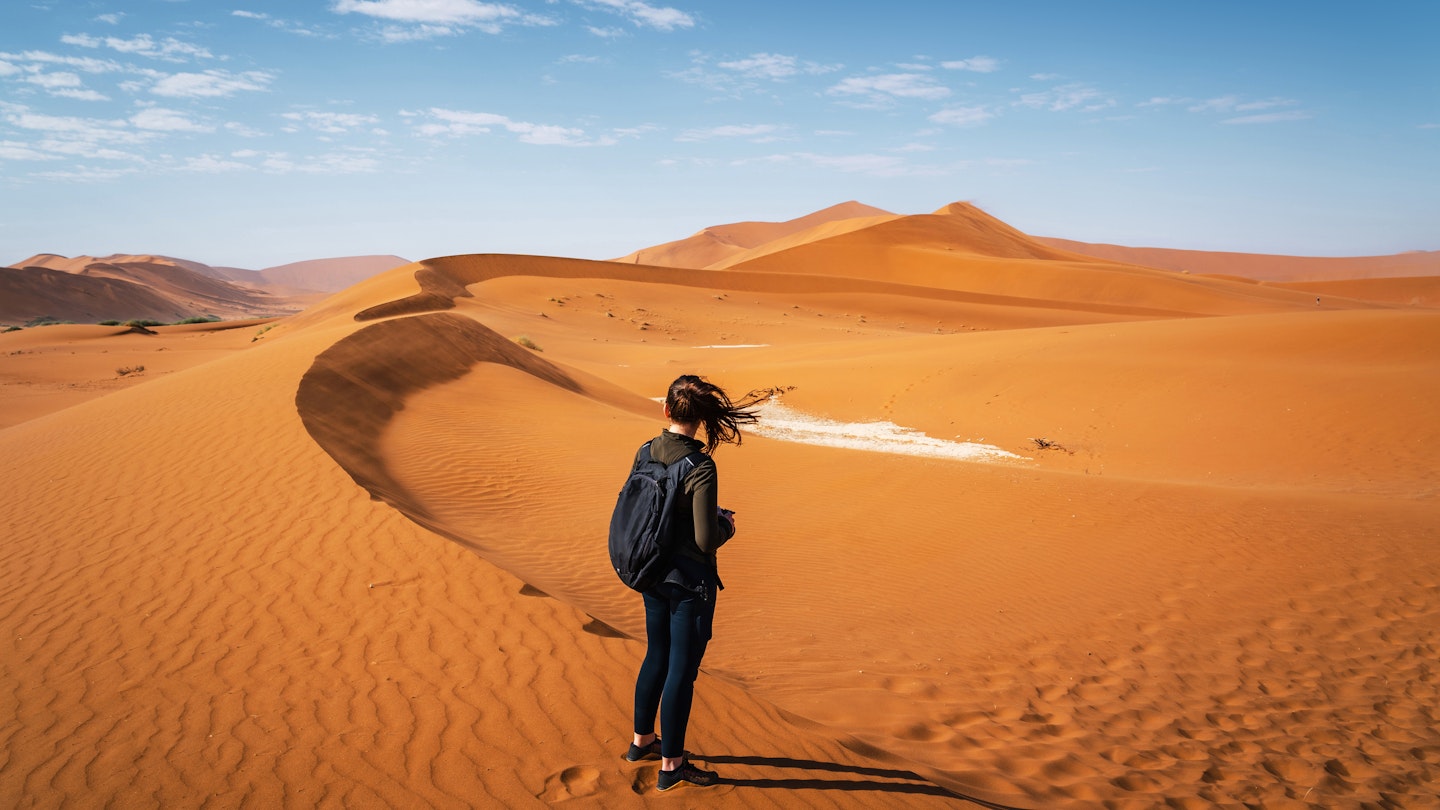
The Namib is the earth's oldest desert and a highlight of any visit to Namibia. Here's how to get a visa to visit Namibia © R.M. Nunes / Getty Images
Welcome to Namibia , one of the world’s newest countries and one of its least densely populated.
With its dramatic and varied topography, Atlantic coastline, fascinating wildlife and ancient desert , it's an ideal vacation location for travelers seeking something different.
To support a well-established tourism industry, the Namibian government has made entry into the country as hassle-free as possible.
Many nationalities do not require visas for shorter visits, including citizens of most countries in southern Africa, many European countries, the USA, UK, Australia and New Zealand. Visitors who do require a visa can generally apply for one on arrival or in advance through Namibian consulates or the Namibian Ministry of Home Affairs.
Read on for more about Namibia’s visa requirements, including information on visa types, costs and how to apply for one.
What you need to know about visas in Namibia
Citizens of more than 50 countries can enter Namibia for up to 90 days without a tourist visa or for almost any other purpose except employment. For a complete listing of visa-exempt countries and general visa information, check the Namibian Ministry of Home Affairs' helpful visa page and the website for the Namibian High Commission in the UK .
On arrival in Namibia, you will receive a free Visitor's Entry Permit stamped into your passport. The maximum possible validity is 90 days, but these permits are often issued for shorter periods. Before leaving the immigration area, it's essential to be sure that the date entered into your passport corresponds to the duration of your planned visit.
Travelers from countries not on Namibia’s visa-exempt list can apply for a visa on arrival (approximately US$50 for a single-entry visa valid for three months) at Hosea Kutako International Airport in Windhoek.
Alternatively, you can apply for a visa through the Namibian embassy in your home country – allow up to two weeks for processing. The Namibia Ministry of Home Affairs website has downloadable visa application forms.
Whether you are visa-exempt or not, check that your passport is valid for at least six months beyond your arrival date in Namibia and has at least three blank endorsement pages.
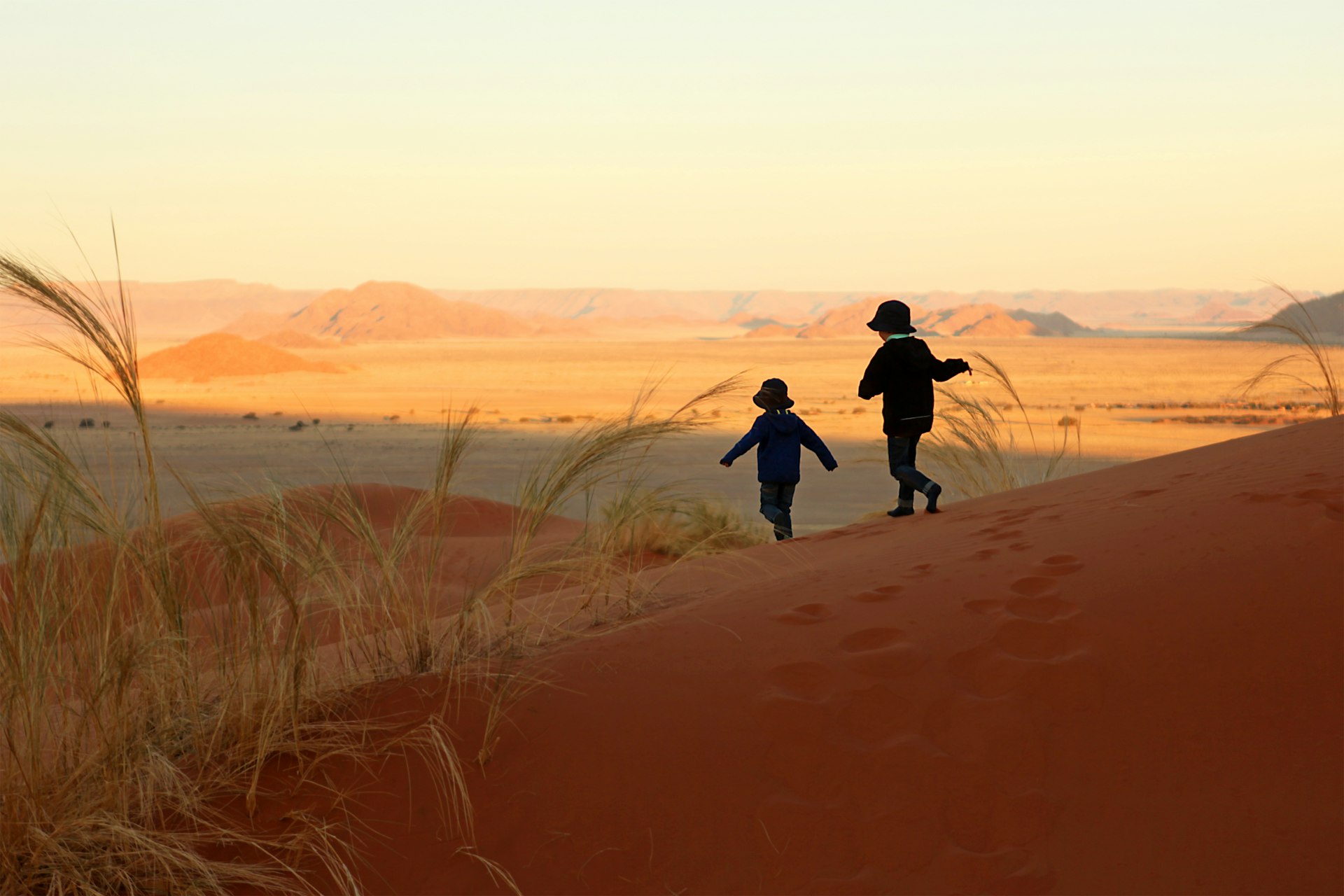
Traveling to Namibia with children
Namibia is a fun family travel destination. If you are traveling with children under 18, you must carry a certified copy of each child’s original birth certificate. If children are traveling with only one parent, you’ll also need to have certified consent from the other parent or proof of sole custody.
Families with adopted children should carry certified copies of adoption certificates or other legal evidence of guardianship. These regulations have been enacted in Namibia and elsewhere in southern Africa to prevent child trafficking, and document checks are carried out with some regularity.
Is it possible to extend your stay in Namibia?
It might happen that Namibia’s fresh air, soaring dunes and clear skies will hook you in, and you’ll want to extend your stay. If so, you can apply for a visa extension (approximately US$40) at the Namibian Ministry of Home Affairs in Windhoek as long as you have not exceeded 90 days in the country.
However, keep in mind that these extension requests are not routinely granted. It’s better to anticipate your maximum desired stay at the outset when you initially enter the country.
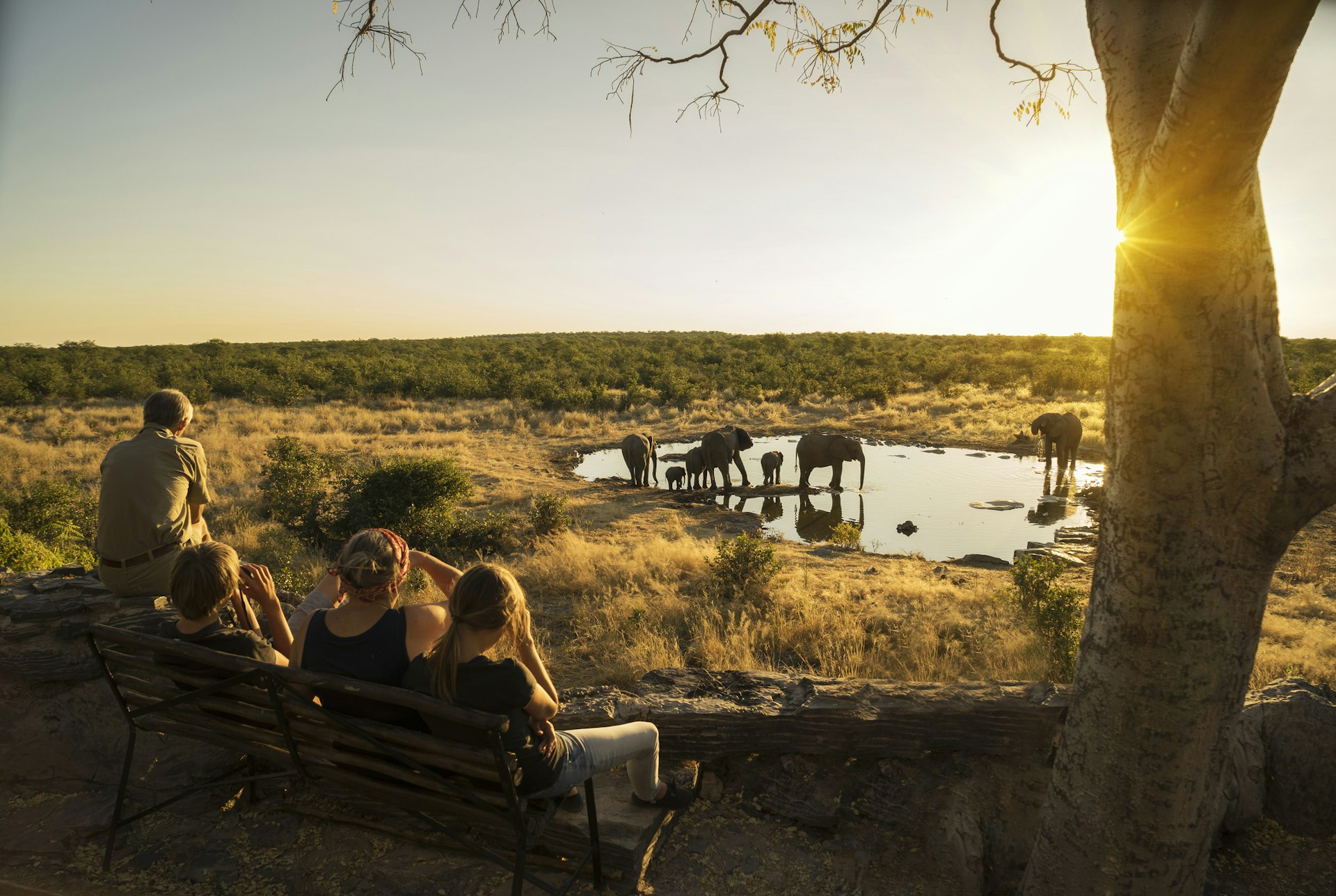
Can I get a visa to work in Namibia?
Namibia does not currently offer working holiday visas. Applications for work visas (for short-term employment of up to six months) and employment permits (for longer-term employment of more than six months) should be made via the Namibian Ministry of Home Affairs website well in advance of your planned arrival. However, Namibia does offer a Digital Nomad Visa for stays of up to six months.
This article was first published Sep 10, 2022 and updated Oct 26, 2023.
Explore related stories
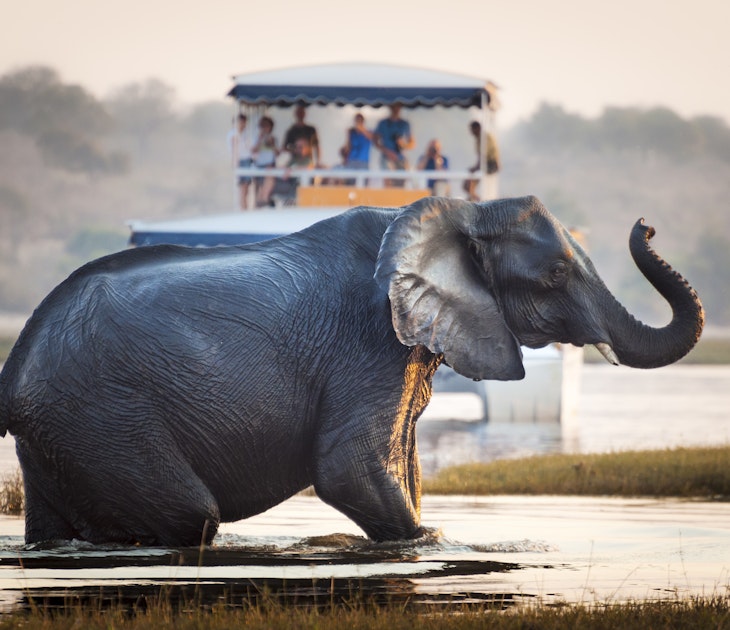
Wildlife & Nature
Feb 20, 2024 • 17 min read
If you’ve never been to Africa before, you’ve much to look forward to. But choosing where to go on your first safari is quite daunting. Here is our guide.
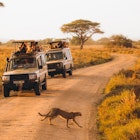
Dec 8, 2023 • 4 min read
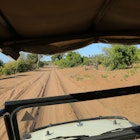
Oct 27, 2023 • 8 min read

Oct 23, 2023 • 4 min read
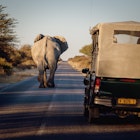
Oct 21, 2023 • 5 min read
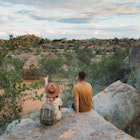
Oct 19, 2023 • 6 min read
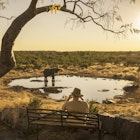
Oct 16, 2023 • 6 min read
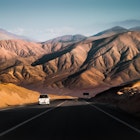
Mar 28, 2023 • 6 min read
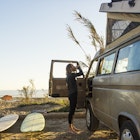
Mar 21, 2023 • 8 min read

Jan 2, 2023 • 12 min read
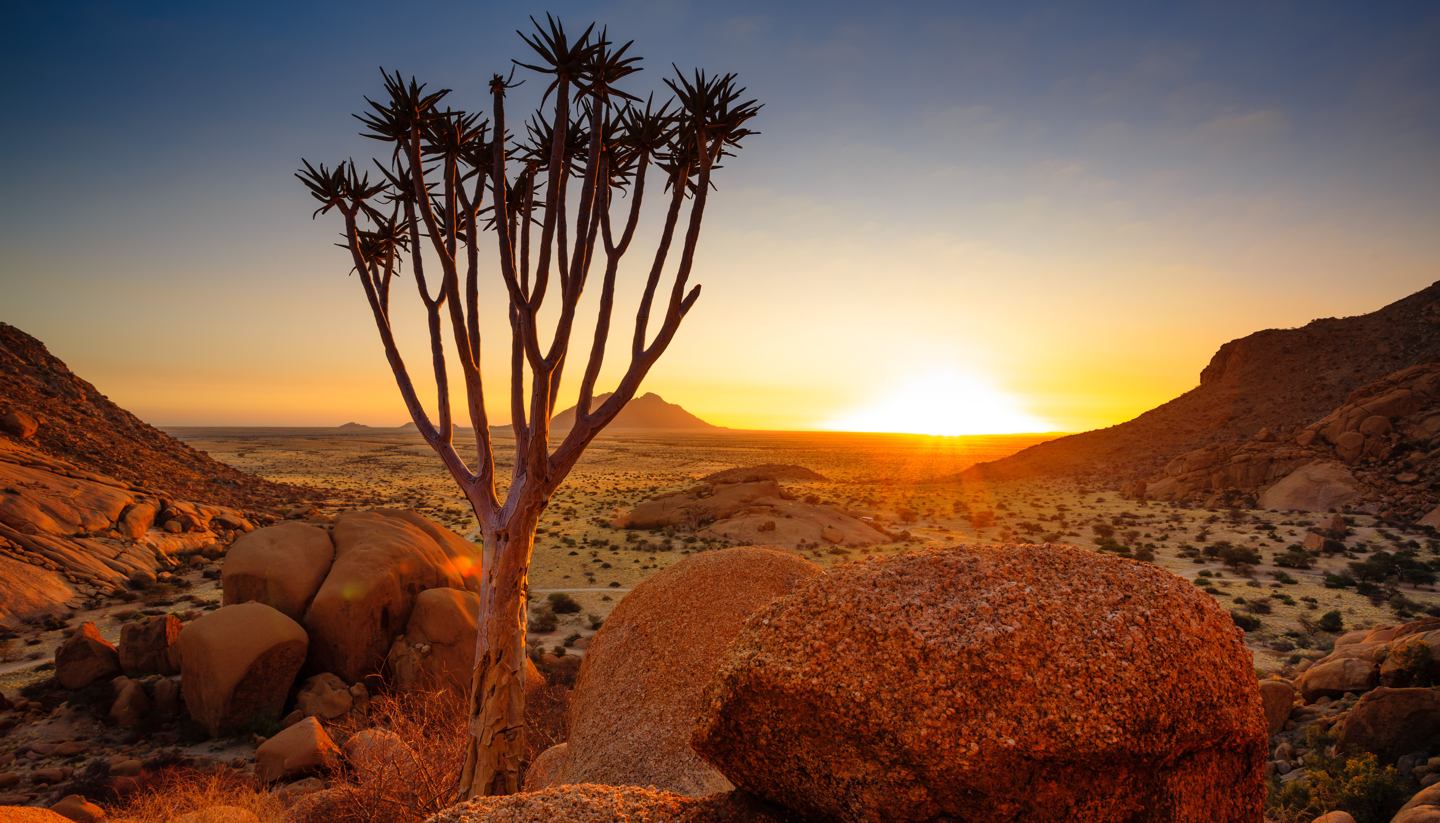
Introducing Namibia
- About Namibia
- Images of Namibia
- History, language & culture
- Weather & geography
- Doing business & staying in touch
Plan your trip
- Travel to Namibia
- Where to stay
While you’re there
- Things to see & do
- Shopping & nightlife
- Food & drink
- Getting around
Before you go
- Passport & visa
- Public Holidays
- Money & duty free
Book your flights
Namibia Visa and Passport Requirements
To enter Namibia, your passport should be valid for at least six months from your entry date and have at least one completely blank page.
If you require a visa, your passport must have at least three blank pages.
Passport Note
Parents travelling with children under 18 must show the original or certified copy of the unabridged birth certificate showing the details of both parents. If the child is travelling with one parent only, then a parental legalised consent affidavit signed by the absent parent is required.
Note *1: Not all EU nationals are exempted from visa requirements when travelling to Namibia. Nationals of Bulgaria, Croatia, Cyprus, Czech Republic, Estonia, Greece, Hungary, Latvia, Lithuania, Malta, Poland, Romania, Slovakia and Slovenia require a visa to visit Namibia.
Namibia allows nationals from 54 countries and territories to enter without a visa for the purpose of tourism for up to 90 days. These countries are Angola, Armenia, Australia, Austria, Azerbaijan, Belarus, Belgium, Botswana, Brazil, Canada, Cuba, Denmark, Finland, France, Germany, Hong Kong, Iceland, Ireland, Italy, Jamaica, Japan, Kazakhstan, Kenya, Kyrgyzstan, Liechtenstein, Lesotho, Luxembourg, Macau, Malawi, Malaysia, Mauritius, Moldova, Mozambique, Netherlands, New Zealand, Norway, Portugal, Russia, Seychelles, Singapore, South Africa, Spain, Swaziland, Sweden, Switzerland, Tajikistan, Tanzania, Turkmenistan, Ukraine, United Kingdom, United States of America, Uzbekistan, Zambia, and Zimbabwe.
In addition, holders of diplomatic and official passports from the following countries can also visit without a visa: Benin, Burkina Faso, Burundi, Cabo Verde, Cameroon, Central African Republic, Chad, Comoros, Cote d’Ivoire, Djibouti, Congo Brazzaville, Congo (DRC), Egypt, Equatorial Guinea, Eritrea, Ethiopia, Gabon, Gambia, Ghana, Guinea, Guinea-Bissau, India, Liberia, Madagascar, Mauritania, Niger, Rwanda, Sao Tome and Principe, Senegal, Sierra Leone, Togo, Tunisia, Uganda, Sahrawi Arab Democratic Republic (Western Sahara), and Venezuela.
All visitors travelling to Namibia for business purposes, including doing volunteer work, require a visa, which must be applied before entering Namibia.
Nationals not referred to in the chart are advised to contact the nearest high commission/embassy for visa requirements for Namibia.
Although nationals from a visa-free country are allowed to stay for a maximum of 90 days, in practice, the immigration officers can grant you a period shorter than that. Before leaving the immigration desk, check that you have been given permission to stay in Namibia for the duration of your intended trip and your passport has a correctly dated entry stamp.
Types and Cost
Fees vary. For travellers applying in the UK, the following fees apply: • Tourist visa: £95 for single-entry or £125 for multiple-entry. • Volunteer visa: £65 for single-entry or £85 for multiple-entry. • Business visa: £125 for single-entry or £155 for multiple-entry. • An additional administrative fee of £35 applies to all visa types.
Usually for stays of up to 90 days from the date of entry.
Application to
Consulate or embassy.
Temporary residence
If you plan to work or study in Namibia, you must obtain a temporary work or study permit from the high commission or embassy in your own country.
Working days
Visa processing takes three days.
Sufficient Funds
Visa applicants must show bookings of flights and accommodation.
Extension of stay
Three-month visa extensions are available from the Ministry of Home Affairs in Windhoek.
Entry with pets
You must obtain a permit to bring a pet into Namibia. Contact the nearest high commission or embassy for further details.
Embassies and tourist offices

Book a Hotel
© Columbus Travel Media Ltd. All rights reserved 2024

- Travel Advice
Getting to Namibia and getting around
Namibia is located in Southern Africa, sharing borders with South Africa, Botswana, Zambia, and Angola. The majority of international tourists get to Namibia by plane arriving at the international airport in Windhoek and continue their onward journey by road, either on self-drive trips or with a professional hired guide. We share further tips with you how to get to Namibia and how to get around.
- Getting to Namibia
- Domestic Flights
- Self-Drive Trips
- Guided tours

HOW TO GET TO NAMIBIA?
International airports in namibia.
There are two international airports in Namibia: Hosea Kutako International Airport (HKIA / WDH) in the capital Windhoek, and Walvis Bay International Airport (WVB) at the Atlantic Ocean west coast. The airport in Windhoek is by far the main airport for international arrivals. There are direct flights among others from South Africa (Johannesburg and Cape Town), Germany (Frankfurt), and Ethiopia (Addis Ababa). Connections from South Africa are popular for international arrivals especially from the US as they are more frequent than from Germany or Ethiopia.
It is also possible to get to Namibia by road: Driving from South Africa, there are land borders, among others, at the remote Ai-Ais/Richtersveld Transfrontier Park and the Kgalagadi Transfrontier Park. A more popular border crossing is between Botswana and Namibia. Among other options, you can cross from Namibia’s Zambezi Region (Caprivi Strip) into Chobe National Park at the Ngoma border. There is no direct connection between Namibia and Victoria Falls in Zimbabwe or Zambia. But you can cross from Namibia into Botswana and reach Victoria Falls in Zimbabwe via Kasane.
We can assist you in organising a crossing-border self-drive trip or guided tour – get in touch !

For those who don’t want to join a guided tour, a self-drive trip in a rental car is an alternative option to get around Namibia.
Are there domestic flights in Namibia?
You can travel domestically by plane in Namibia. However, this means you have to charter private planes. We currently don’t offer any options to travel by scheduled domestic flights.
There are a number of airports across Namibia, often used for cargo flights, which are also serviced by tourist charter planes. If you want to skip the long driving distances on the road, you can opt for a fly-in safari and travel Namibia by small aircraft such as Cessnas on private charters.
Self-Drive Trips in Namibia
Getting around in Namibia by rental car on a self-drive trip is one of the most popular options. Most of these trips start in Windhoek, where there are multiple rental car companies, and you can stock up on supplies at well stocked supermarkets. You can rent 2×4 or 4×4 vehicles, fully equipped with camping gear and roof top tents or less equipped if you’re staying at lodges and camps.
Namibia is a popular self-drive destination in Southern Africa as it is considered a safe travel destination and easily accessible. We organise your self-drive trip and have put together some of our favourite itineraries for you here .
Guided tours in Namibia
If you prefer not to drive yourself, guided tours are a great option to get around in Namibia. You travel in one of our converted comfortable safari cars; your guide is also your driver and will take care of any logistics and organisational matters. You can sit back, relax, and enjoy. Another advantage of getting around Namibia on a guided tour: Your guide will share useful information about flora, fauna, country, culture, and the people of Namibia – they are your window into a new country.
We organise scheduled group tours as well as private guided tours around Namibia – you will find more information here .
Visa Requirements to enter Namibia
Namibia issues tourist visa for stays less than 90 days. Whether you need a visa to enter Namibia depends on your nationality. There are a fairly large number of jurisdictions that are exempt from obtaining a tourist visa to enter Namibia for stays less than 90 days and for holiday purposes. For example, if you are a national of Australia, Canada, the US, Germany, France, the Netherlands or Italy, you don’t need a visa to enter Namibia as a tourist. As the list of exempted jurisdictions is quite long, we recommend checking if your nationality is on this list!
If your nationality is not on the list of exempted jurisdictions, you do need to obtain a tourist visa before entering Namibia. For many nationalities it is possible to obtain the visa on arrival at the airport against a visa fee.
To enter Namibia, you need a passport that is valid for at least another 6 months and has at least 3 blank pages.
If you travel with children, in many cases you need to provide their birth certificates. If both parents, or legal guardians accompany the under-18, you just need to present the unabridged birth certificate as well as the child’s passport. If only one parent or legal guardian travels with the child, they need to additionally provide an affidavit of consent signed by the absent parent or guardian, a death certificate or court order. This is to ensure that the absent parent has given consent that you may travel with the child. All documents need to be in English language.
Visa regulations and entry requirements can change at short notice, and you need to contact the Namibian embassy in your country to request up-to-date reliable information. We advise you to do so well in advance before confirming your booking as we cannot be held liable if you can’t obtain the correct visa to start your trip. All costs incurred due to a delay in travelling are for the traveller’s account.
DISCOVER EXCLUSIVE NAMIBIA SAFARIS
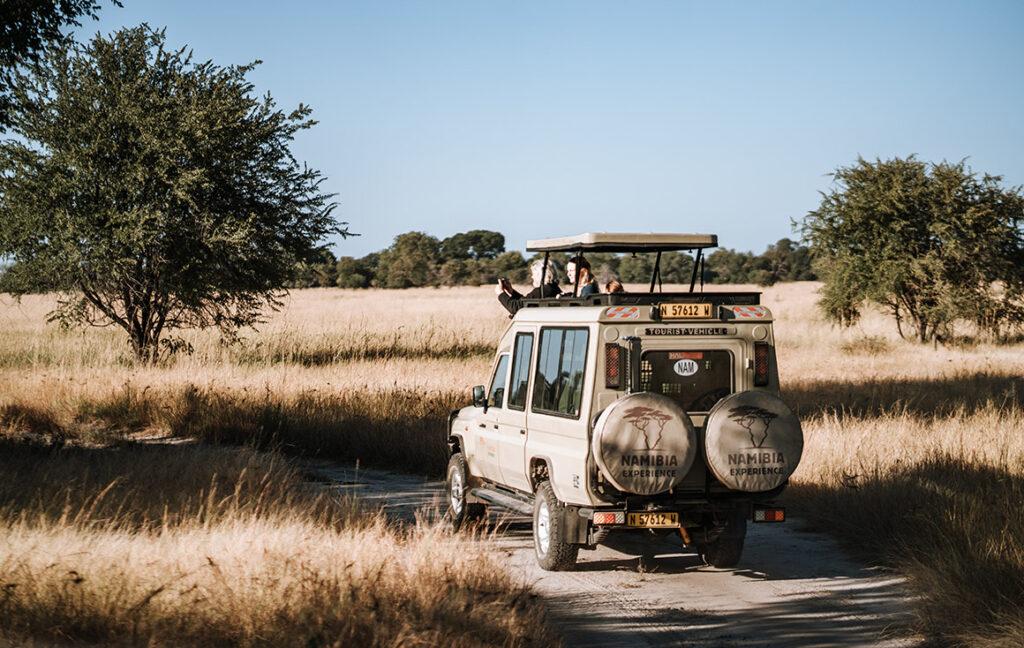
Guided Lodge Tours
Travel with your local guide and relax at guest houses and lodges.
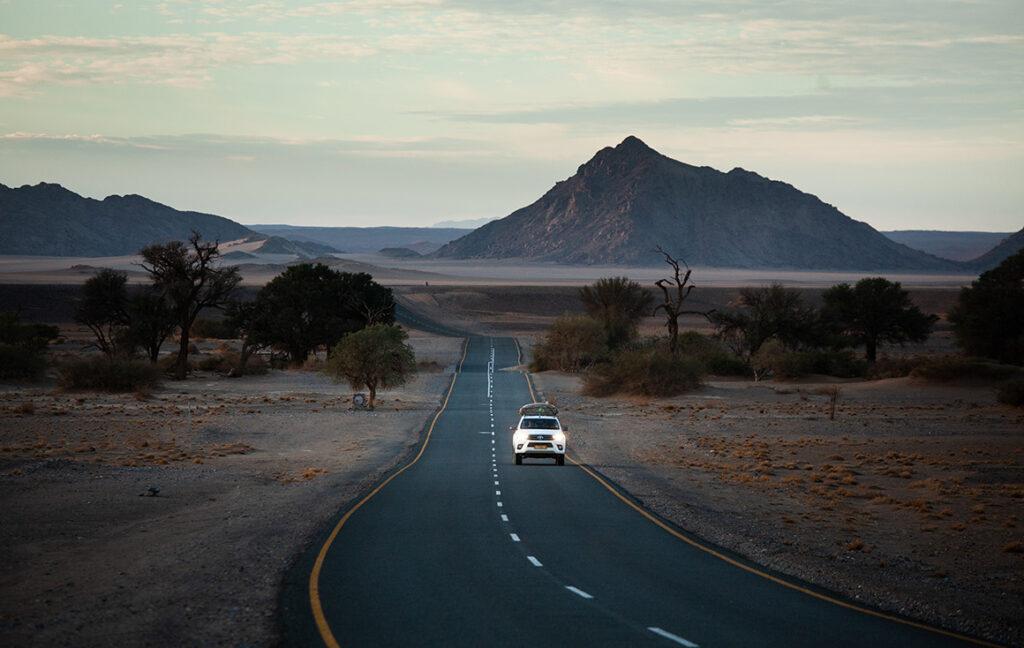
Self-Drive Tours
The road trip experience: Travel independently in your rental car.
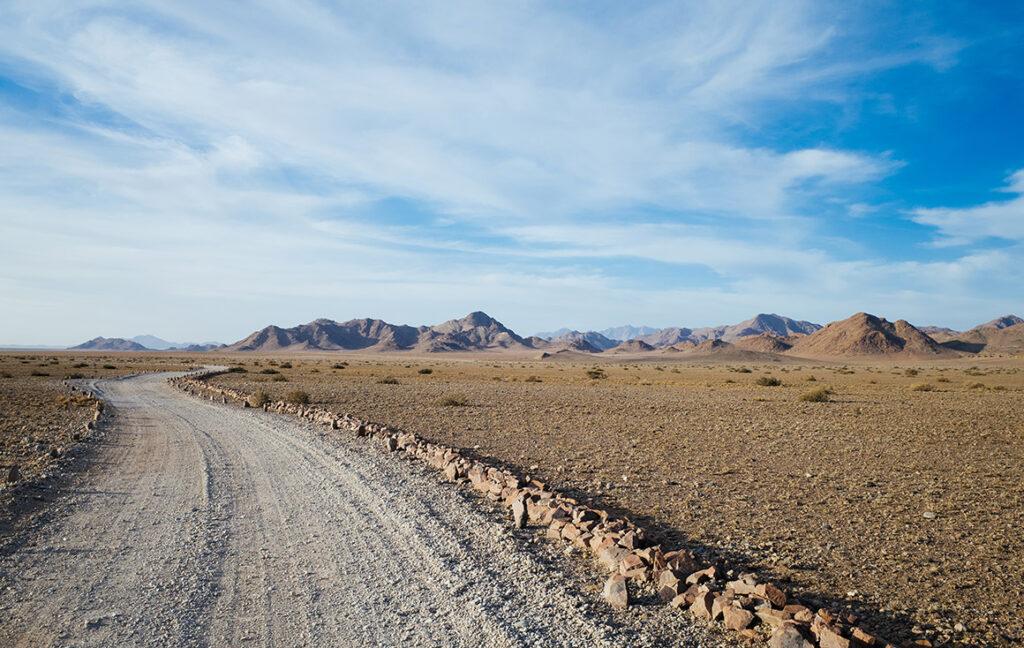
Tailor-Made Tours
Your personalised holiday: from the itinerary to the smallest detail.

OUR EXPERT ADVICE
Take it slow.
Driving distances in Namibia are very long and spending many hours in the car is simply part of the experience. Allow yourself enough time to stop along the way, enjoy the views and take a break. Spending more than one night at one accommodation will give you the time to really experience your surroundings. Time is a luxury – treat yourself to it!

Experience Namibia with us
Speak to one of our local advisors, let's start planning your trip.
We will get back to you within 2 working days.
Namibia Travel Restrictions
Traveler's COVID-19 vaccination status
Traveling from the United States to Namibia
Open for vaccinated visitors
COVID-19 testing
Not required
Not required for vaccinated visitors
Restaurants
Not required in public spaces and public transportation.
Ready to travel?
Find flights to namibia, find stays in namibia, explore more countries on travel restrictions map, destinations you can travel to now, dominican republic, netherlands, philippines, puerto rico, switzerland, united arab emirates, united kingdom, know when to go.
Sign up for email alerts as countries begin to open - choose the destinations you're interested in so you're in the know.
Can I travel to Namibia from the United States?
Most visitors from the United States, regardless of vaccination status, can enter Namibia.
Can I travel to Namibia if I am vaccinated?
Fully vaccinated visitors from the United States can enter Namibia without restrictions.
Can I travel to Namibia without being vaccinated?
Unvaccinated visitors from the United States can enter Namibia without restrictions.
Do I need a COVID test to enter Namibia?
Visitors from the United States are not required to present a negative COVID-19 PCR test or antigen result upon entering Namibia.
Can I travel to Namibia without quarantine?
Travelers from the United States are not required to quarantine.
Do I need to wear a mask in Namibia?
Mask usage in Namibia is not required in public spaces and public transportation.
Are the restaurants and bars open in Namibia?
Restaurants in Namibia are open. Bars in Namibia are .
- Skip to main content
- Skip to "About this site"
Language selection
Search travel.gc.ca.
Help us to improve our website. Take our survey !
COVID-19: travel health notice for all travellers
Namibia travel advice
Latest updates: The Need help? section was updated.
Last updated: April 5, 2024 07:27 ET
On this page
Safety and security, entry and exit requirements, laws and culture, natural disasters and climate, namibia - exercise a high degree of caution.
Exercise a high degree of caution in Namibia due to the high level of crime.
Back to top
Border with Angola
Peace in Angola has improved the security situation along the Namibia–Angola border. Due to the risk of banditry, however, you should exercise caution when travelling to this area, including Kavango Region in the northeast and the western half of Zambezi Region (formerly known as Caprivi). Use official border crossing areas only to enter neighbouring countries.
There are landmines in the border area from Katwitwi (a village on the Okavango River in Kavango West Region) to Kongola (a town in Zambezi Region).
Petty crime
Petty crime, such as pickpocketing, bag snatching and cellphone theft, occurs regularly.
Theft is frequent in:
- popular tourist areas
- crowded places, including urban shopping areas
- vehicles, especially unattended vehicles at gas stations and
- ATMs and surrouding areas
During your trip to Namibia:
- ensure that your personal belongings, including your passport and your other travel documents, are secure at all times
- avoid showing signs of affluence or wearing expensive jewellery
- avoid carrying large sums of cash or unnecessary valuables
- never leave personal belongings unattended in a vehicle, even in the trunk
- be extra cautious when withdrawing cash from ATMs
Violent crime
Violent crime occurs, particularly in Windhoek. Incidents include :
- carjackings
During your stay:
- avoid walking alone after dark
- keep your accommodations doors and windows locked at all times
- keep your car doors locked and windows closed, especially in heavy traffic
Demonstrations
Demonstrations are rare and occur mostly in Windhoek. They can disrupt traffic and business.
Even peaceful demonstrations can turn violent at any time. They can also lead to disruptions to traffic and public transportation.
- Avoid areas where demonstrations and large gatherings are taking place
- Follow the instructions of local authorities
- Monitor local media for information on ongoing demonstrations
Mass gatherings (large-scale events)
Cases of attempted fraud are frequently reported in Namibia.
Credit card copying in some hotels and lodges occurs. When paying by credit card, keep your card in view at all times. Be extra vigilant at ATMs, as criminals may attempt to distract you or offer assistance with the aim of stealing your money. Don’t accept any offer of assistance and cancel your transaction if you become suspicious.
- Pay careful attention when your cards are being handled by others
- Use ATMs located in well-lit public areas or inside a bank or business
- Avoid using card readers with an irregular or unusual feature
- Cover the keypad with one hand when entering your PIN
- Check for any unauthorized transaction on your account statements
Overseas fraud
Wildlife viewing
Wildlife viewing poses risks, particularly if you are on foot or at close range.
- Only use reputable and professional guides or tour operators
- Always maintain a safe distance when observing wildlife
- Only exit a vehicle when a professional guide or warden says it’s safe to do so
- Closely follow park and warden’s advice
Road safety
Avoid night-time driving outside urban centres.
Be particularly careful when driving on rural roads, many of which are gravel with sloping sand shoulders.
Road conditions are generally good, but much of the country is covered by desert. Overland travel takes considerable time. Sand, salt and gravel roads become very slippery when wet.
Tourists are often involved in single-vehicle accidents. Do not exceed 80 km/h on gravel roads. Excessive speed and animals on the roadway pose hazards.
Emergency and roadside assistance is unreliable or non-existent outside Windhoek.
If you must travel overland via the Trans-Caprivi Highway between Rundu and Katima Mulilo, do so during daylight hours only.
Avoid stopping at roadside rest stops, where robberies have been known to occur.
If travelling to desert areas, do so with sufficient water and fuel supplies and two spare tires. Travel by convoy if you plan to go to the desert.
Public transportation
Buses and taxis operate in the capital. Public transportation is limited outside Windhoek.
Foreigners have been robbed by taxi drivers. The Namibia Bus and Taxi Association (NABTA) regulates taxi drivers by allocating registration numbers (one letter followed by a two-digit number). Use registered taxis (displaying the NABTA logo) only or arrange for a taxi through a reputable hotel.
We do not make assessments on the compliance of foreign domestic airlines with international safety standards.
Information about foreign domestic airlines
Every country or territory decides who can enter or exit through its borders. The Government of Canada cannot intervene on your behalf if you do not meet your destination’s entry or exit requirements.
We have obtained the information on this page from the Namibian authorities. It can, however, change at any time.
Verify this information with the Foreign Representatives in Canada .
Entry requirements vary depending on the type of passport you use for travel.
Before you travel, check with your transportation company about passport requirements. Its rules on passport validity may be more stringent than the country’s entry rules.
Regular Canadian passport
Your passport must be valid for a minimum of 6 months after the date you enter Namibia.
Passport for official travel
Different entry rules may apply.
Official travel
Passport with “X” gender identifier
While the Government of Canada issues passports with an “X” gender identifier, it cannot guarantee your entry or transit through other countries. You might face entry restrictions in countries that do not recognize the “X” gender identifier. Before you leave, check with the closest foreign representative for your destination.
Other travel documents
Different entry rules may apply when travelling with a temporary passport or an emergency travel document. Before you leave, check with the closest foreign representative for your destination.
Useful links
- Foreign Representatives in Canada
- Canadian passports
Tourist visa: not required for stays up to 90 days Business visa: not required for stays up to 90 days Student visa: required Employment visa: Required
Ensure that your passport has sufficient visa pages for travel to Namibia and neighbouring countries for the entire duration of your trip.
At least 2 completely blank pages are required for entry into Namibia.
Make sure the visa stamp is valid for the duration of your stay (up to 90 days) and that immigration officials have given you a correctly dated entry stamp, as this will be checked upon departure.
Authorities are very strict regarding visa validity. Overstaying the time granted or having an incorrect or missing entry stamp could lead to detention, arrest and fines.
Children and travel
Learn more about travelling with children .
Exit and entry requirements for minors under 18
When travelling to an international destination, underage traveller must present:
If travelling with both parents
- A valid passport
- A long-form birth certificate
If travelling with a single parent
- A letter of consent from the other parent or a copy of a death certificate when applicable
If travelling with other adults
- A proof of consent from the biological parents or legal guardians in the form of a sworn affidavit for the child to travel internationally
- Contact information of the child’s parents or legal guardians
If travelling alone
- A proof of consent from one or both parents or legal guardians in the form of a sworn affidavit for the child to travel
- A letter from the person who is to receive the child containing the residential address and contact details where the child will be residing
- A copy of the identity document of the person who is to receive the child. This could be:
- a valid passport and visa
- a permanent residence permit
If you are transiting by road through South Africa with children under the age of 18, consult the entry/exit requirements for South Africa .
Yellow fever
Learn about potential entry requirements related to yellow fever (vaccines section).
Relevant Travel Health Notices
- Global Measles Notice - 13 March, 2024
- COVID-19 and International Travel - 13 March, 2024
This section contains information on possible health risks and restrictions regularly found or ongoing in the destination. Follow this advice to lower your risk of becoming ill while travelling. Not all risks are listed below.
Consult a health care professional or visit a travel health clinic preferably 6 weeks before you travel to get personalized health advice and recommendations.
Routine vaccines
Be sure that your routine vaccinations , as per your province or territory , are up-to-date before travelling, regardless of your destination.
Some of these vaccinations include measles-mumps-rubella (MMR), diphtheria, tetanus, pertussis, polio, varicella (chickenpox), influenza and others.
Pre-travel vaccines and medications
You may be at risk for preventable diseases while travelling in this destination. Talk to a travel health professional about which medications or vaccines may be right for you, based on your destination and itinerary.
Yellow fever is a disease caused by a flavivirus from the bite of an infected mosquito.
Travellers get vaccinated either because it is required to enter a country or because it is recommended for their protection.
- There is no risk of yellow fever in this country.
Country Entry Requirement*
- Proof of vaccination is required if you are coming from or have transited through an airport of a country where yellow fever occurs.
Recommendation
- Vaccination is not recommended.
- Discuss travel plans, activities, and destinations with a health care professional.
- Contact a designated Yellow Fever Vaccination Centre well in advance of your trip to arrange for vaccination.
About Yellow Fever
Yellow Fever Vaccination Centres in Canada * It is important to note that country entry requirements may not reflect your risk of yellow fever at your destination. It is recommended that you contact the nearest diplomatic or consular office of the destination(s) you will be visiting to verify any additional entry requirements.
There is a risk of hepatitis A in this destination. It is a disease of the liver. People can get hepatitis A if they ingest contaminated food or water, eat foods prepared by an infectious person, or if they have close physical contact (such as oral-anal sex) with an infectious person, although casual contact among people does not spread the virus.
Practise safe food and water precautions and wash your hands often. Vaccination is recommended for all travellers to areas where hepatitis A is present.
Measles is a highly contagious viral disease. It can spread quickly from person to person by direct contact and through droplets in the air.
Anyone who is not protected against measles is at risk of being infected with it when travelling internationally.
Regardless of where you are going, talk to a health care professional before travelling to make sure you are fully protected against measles.
Hepatitis B is a risk in every destination. It is a viral liver disease that is easily transmitted from one person to another through exposure to blood and body fluids containing the hepatitis B virus. Travellers who may be exposed to blood or other bodily fluids (e.g., through sexual contact, medical treatment, sharing needles, tattooing, acupuncture or occupational exposure) are at higher risk of getting hepatitis B.
Hepatitis B vaccination is recommended for all travellers. Prevent hepatitis B infection by practicing safe sex, only using new and sterile drug equipment, and only getting tattoos and piercings in settings that follow public health regulations and standards.
Coronavirus disease (COVID-19) is an infectious viral disease. It can spread from person to person by direct contact and through droplets in the air.
It is recommended that all eligible travellers complete a COVID-19 vaccine series along with any additional recommended doses in Canada before travelling. Evidence shows that vaccines are very effective at preventing severe illness, hospitalization and death from COVID-19. While vaccination provides better protection against serious illness, you may still be at risk of infection from the virus that causes COVID-19. Anyone who has not completed a vaccine series is at increased risk of being infected with the virus that causes COVID-19 and is at greater risk for severe disease when travelling internationally.
Before travelling, verify your destination’s COVID-19 vaccination entry/exit requirements. Regardless of where you are going, talk to a health care professional before travelling to make sure you are adequately protected against COVID-19.
The best way to protect yourself from seasonal influenza (flu) is to get vaccinated every year. Get the flu shot at least 2 weeks before travelling.
The flu occurs worldwide.
- In the Northern Hemisphere, the flu season usually runs from November to April.
- In the Southern Hemisphere, the flu season usually runs between April and October.
- In the tropics, there is flu activity year round.
The flu vaccine available in one hemisphere may only offer partial protection against the flu in the other hemisphere.
The flu virus spreads from person to person when they cough or sneeze or by touching objects and surfaces that have been contaminated with the virus. Clean your hands often and wear a mask if you have a fever or respiratory symptoms.
Malaria is a serious and sometimes fatal disease that is caused by parasites spread through the bites of mosquitoes. There is a risk of malaria in certain areas and/or during a certain time of year in this destination.
Antimalarial medication may be recommended depending on your itinerary and the time of year you are travelling. Consult a health care professional or visit a travel health clinic before travelling to discuss your options. It is recommended to do this 6 weeks before travel, however, it is still a good idea any time before leaving. Protect yourself from mosquito bites at all times: • Cover your skin and use an approved insect repellent on uncovered skin. • Exclude mosquitoes from your living area with screening and/or closed, well-sealed doors and windows. • Use insecticide-treated bed nets if mosquitoes cannot be excluded from your living area. • Wear permethrin-treated clothing. If you develop symptoms similar to malaria when you are travelling or up to a year after you return home, see a health care professional immediately. Tell them where you have been travelling or living.
In this destination, rabies is commonly carried by dogs and some wildlife, including bats. Rabies is a deadly disease that spreads to humans primarily through bites or scratches from an infected animal. While travelling, take precautions , including keeping your distance from animals (including free-roaming dogs), and closely supervising children.
If you are bitten or scratched by a dog or other animal while travelling, immediately wash the wound with soap and clean water and see a health care professional. In this destination, rabies treatment may be limited or may not be available, therefore you may need to return to Canada for treatment.
Before travel, discuss rabies vaccination with a health care professional. It may be recommended for travellers who are at high risk of exposure (e.g., occupational risk such as veterinarians and wildlife workers, children, adventure travellers and spelunkers, and others in close contact with animals).
Safe food and water precautions
Many illnesses can be caused by eating food or drinking beverages contaminated by bacteria, parasites, toxins, or viruses, or by swimming or bathing in contaminated water.
- Learn more about food and water precautions to take to avoid getting sick by visiting our eat and drink safely abroad page. Remember: Boil it, cook it, peel it, or leave it!
- Avoid getting water into your eyes, mouth or nose when swimming or participating in activities in freshwater (streams, canals, lakes), particularly after flooding or heavy rain. Water may look clean but could still be polluted or contaminated.
- Avoid inhaling or swallowing water while bathing, showering, or swimming in pools or hot tubs.
Travellers' diarrhea is the most common illness affecting travellers. It is spread from eating or drinking contaminated food or water.
Risk of developing travellers' diarrhea increases when travelling in regions with poor standards of hygiene and sanitation. Practise safe food and water precautions.
The most important treatment for travellers' diarrhea is rehydration (drinking lots of fluids). Carry oral rehydration salts when travelling.
Typhoid is a bacterial infection spread by contaminated food or water. Risk is higher among children, travellers going to rural areas, travellers visiting friends and relatives or those travelling for a long period of time.
Travellers visiting regions with a risk of typhoid, especially those exposed to places with poor sanitation, should speak to a health care professional about vaccination.
There is a risk of schistosomiasis in this destination. Schistosomiasis is a parasitic disease caused by tiny worms (blood flukes) which can be found in freshwater (lakes, rivers, ponds, and wetlands). The worms can break the skin, and their eggs can cause stomach pain, diarrhea, flu-like symptoms, or urinary problems. Schistosomiasis mostly affects underdeveloped and r ural communities, particularly agricultural and fishing communities.
Most travellers are at low risk. Travellers should avoid contact with untreated freshwater such as lakes, rivers, and ponds (e.g., swimming, bathing, wading, ingesting). There is no vaccine or medication available to prevent infection.
Cholera is a risk in parts of this country. Most travellers are at very low risk.
To protect against cholera, all travellers should practise safe food and water precautions .
Travellers at higher risk of getting cholera include those:
- visiting, working or living in areas with limited access to safe food, water and proper sanitation
- visiting areas where outbreaks are occurring
Vaccination may be recommended for high-risk travellers, and should be discussed with a health care professional.
Insect bite prevention
Many diseases are spread by the bites of infected insects such as mosquitoes, ticks, fleas or flies. When travelling to areas where infected insects may be present:
- Use insect repellent (bug spray) on exposed skin
- Cover up with light-coloured, loose clothes made of tightly woven materials such as nylon or polyester
- Minimize exposure to insects
- Use mosquito netting when sleeping outdoors or in buildings that are not fully enclosed
To learn more about how you can reduce your risk of infection and disease caused by bites, both at home and abroad, visit our insect bite prevention page.
Find out what types of insects are present where you’re travelling, when they’re most active, and the symptoms of the diseases they spread.
There is a risk of chikungunya in this country. The risk may vary between regions of a country. Chikungunya is a virus spread through the bite of an infected mosquito. Chikungunya can cause a viral disease that typically causes fever and pain in the joints. In some cases, the joint pain can be severe and last for months or years.
Protect yourself from mosquito bites at all times. There is no vaccine available for chikungunya.
- In this country, risk of dengue is sporadic. It is a viral disease spread to humans by mosquito bites.
- Dengue can cause flu-like symptoms. In some cases, it can lead to severe dengue, which can be fatal.
- The level of risk of dengue changes seasonally, and varies from year to year. The level of risk also varies between regions in a country and can depend on the elevation in the region.
- Mosquitoes carrying dengue typically bite during the daytime, particularly around sunrise and sunset.
- Protect yourself from mosquito bites . There is no vaccine or medication that protects against dengue fever.
Rift Valley fever is a viral disease that can cause severe flu-like symptoms. In some cases, it can be fatal. It is spread to humans through contact with infected animal blood or tissues, from the bite of an infected mosquito, or eating or drinking unpasteurized dairy. Risk is generally low for most travellers. Protect yourself from insect bites and avoid animals, particularly livestock, and unpasteurized dairy. There is no vaccine available for Rift Valley fever.
Animal precautions
Some infections, such as rabies and influenza, can be shared between humans and animals. Certain types of activities may increase your chance of contact with animals, such as travelling in rural or forested areas, camping, hiking, and visiting wet markets (places where live animals are slaughtered and sold) or caves.
Travellers are cautioned to avoid contact with animals, including dogs, livestock (pigs, cows), monkeys, snakes, rodents, birds, and bats, and to avoid eating undercooked wild game.
Closely supervise children, as they are more likely to come in contact with animals.
Person-to-person infections
Stay home if you’re sick and practise proper cough and sneeze etiquette , which includes coughing or sneezing into a tissue or the bend of your arm, not your hand. Reduce your risk of colds, the flu and other illnesses by:
- washing your hands often
- avoiding or limiting the amount of time spent in closed spaces, crowded places, or at large-scale events (concerts, sporting events, rallies)
- avoiding close physical contact with people who may be showing symptoms of illness
Sexually transmitted infections (STIs) , HIV , and mpox are spread through blood and bodily fluids; use condoms, practise safe sex, and limit your number of sexual partners. Check with your local public health authority pre-travel to determine your eligibility for mpox vaccine.
Tuberculosis is an infection caused by bacteria and usually affects the lungs.
For most travellers the risk of tuberculosis is low.
Travellers who may be at high risk while travelling in regions with risk of tuberculosis should discuss pre- and post-travel options with a health care professional.
High-risk travellers include those visiting or working in prisons, refugee camps, homeless shelters, or hospitals, or travellers visiting friends and relatives.
HIV (Human Immunodeficiency Virus) is a virus that attacks and impairs the immune system, resulting in a chronic, progressive illness known as AIDS (Acquired Immunodeficiency Syndrome).
High risk activities include anything which puts you in contact with blood or body fluids, such as unprotected sex and exposure to unsterilized needles for medications or other substances (for example, steroids and drugs), tattooing, body-piercing or acupuncture.
Medical services and facilities
Medical facilities are relatively modern, particularly in the capital. Well-equipped facilities are rarely available in smaller towns.
Upfront payment is generally required, even if you have medical insurance.
Ensure that your insurance policy covers all the activities that you plan to undertake, particularly in the case of extreme sports.
Make sure you get travel insurance that includes coverage for medical evacuation and hospital stays.
Travel health and safety
Keep in Mind...
The decision to travel is the sole responsibility of the traveller. The traveller is also responsible for his or her own personal safety.
Be prepared. Do not expect medical services to be the same as in Canada. Pack a travel health kit , especially if you will be travelling away from major city centres.
You must abide by local laws.
Learn about what you should do and how we can help if you are arrested or detained abroad .
Penalties for drug offences are severe and include lengthy prison sentences.
Drugs, alcohol and travel
Identification
Carry a copy of your passport at all times.
Diamonds and other protected resources should be purchased from licensed shops.
If you are convicted of illegally dealing in diamonds, you could face heavy fines and/or imprisonment. The purchase and export of other protected resources, such as elephant ivory, may be subject to restrictions.
Photography
Do not photograph military sites or government buildings. Ask permission before taking photographs.
You should dress conservatively.
2SLGBTQI+ travellers
Namibian law prohibits sexual acts between individuals of the same sex.
2SLGBTQI+ travellers should carefully consider the risks of travelling to Namibia.
Travel and your sexual orientation, gender identity, gender expression and sex characteristics
International Child Abduction
The Hague Convention on the Civil Aspects of International Child Abduction is an international treaty. It can help parents with the return of children who have been removed to or retained in certain countries in violation of custody rights. It does not apply between Canada and Namibia.
If your child was wrongfully taken to, or is being held in Namibia by an abducting parent:
- act as quickly as you can
- consult a lawyer in Canada and in Namibia to explore all the legal options for the return of your child
- report the situation to the nearest Canadian government office abroad or to the Vulnerable Children’s Consular Unit at Global Affairs Canada by calling the Emergency Watch and Response Centre.
If your child was removed from a country other than Canada, consult a lawyer to determine if The Hague Convention applies.
Be aware that Canadian consular officials cannot interfere in private legal matters or in another country’s judicial affairs.
- International Child Abduction: A Guidebook for Left-Behind Parents
- Travelling with children
- Canadian embassies and consulates by destination
- Emergency Watch and Response Centre
Traffic drives on the left.
You can use an original Canadian driver’s licence printed in English, but you should also carry a valid international driving permit.
If renting a car, pay particular attention to the insurance coverage provided. Ensure you have comprehensive insurance.
It is illegal to use a cellular telephone while driving or to drive under the influence of alcohol or drugs.
The use of a seatbelt is compulsory for the driver and all passengers.
A charge of culpable homicide can be made against a driver involved in an accident resulting in death.
International Driving Permit
The currency is the Namibian dollar (NAD). The South African rand (ZAR) is also accepted.
Major credit cards are accepted and most ATMs are linked to international networks.
The dry season extends from April to October, and the rainy season extends from November to March. Unpaved roads may become impassable during the rainy season. You should follow regional weather forecasts and plan accordingly.
Local services
Dial 264 (61) 10111 for emergency assistance.
Consular assistance
South Africa, Lesotho, Madagascar, Mauritius, Namibia
For emergency consular assistance, call the High Commission of Canada in South Africa, in Pretoria, and follow the instructions. At any time, you may also contact the Emergency Watch and Response Centre in Ottawa.
The decision to travel is your choice and you are responsible for your personal safety abroad. We take the safety and security of Canadians abroad very seriously and provide credible and timely information in our Travel Advice to enable you to make well-informed decisions regarding your travel abroad.
The content on this page is provided for information only. While we make every effort to give you correct information, it is provided on an "as is" basis without warranty of any kind, expressed or implied. The Government of Canada does not assume responsibility and will not be liable for any damages in connection to the information provided.
If you need consular assistance while abroad, we will make every effort to help you. However, there may be constraints that will limit the ability of the Government of Canada to provide services.
Learn more about consular services .
Risk Levels
take normal security precautions.
Take similar precautions to those you would take in Canada.
Exercise a high degree of caution
There are certain safety and security concerns or the situation could change quickly. Be very cautious at all times, monitor local media and follow the instructions of local authorities.
IMPORTANT: The two levels below are official Government of Canada Travel Advisories and are issued when the safety and security of Canadians travelling or living in the country or region may be at risk.
Avoid non-essential travel
Your safety and security could be at risk. You should think about your need to travel to this country, territory or region based on family or business requirements, knowledge of or familiarity with the region, and other factors. If you are already there, think about whether you really need to be there. If you do not need to be there, you should think about leaving.
Avoid all travel
You should not travel to this country, territory or region. Your personal safety and security are at great risk. If you are already there, you should think about leaving if it is safe to do so.
Cookies on GOV.UK
We use some essential cookies to make this website work.
We’d like to set additional cookies to understand how you use GOV.UK, remember your settings and improve government services.
We also use cookies set by other sites to help us deliver content from their services.
You have accepted additional cookies. You can change your cookie settings at any time.
You have rejected additional cookies. You can change your cookie settings at any time.
- Passports, travel and living abroad
- Travel abroad
- Foreign travel advice
Warnings and insurance
The Foreign, Commonwealth & Development Office ( FCDO ) provides advice about risks of travel to help British nationals make informed decisions. Find out more about FCDO travel advice .
Before you travel
No travel can be guaranteed safe. Read all the advice in this guide and any specific travel advice that applies to you:
- women travellers
- disabled travellers
- LGBT+ travellers
Follow and contact FCDO travel on Twitter , Facebook and Instagram . You can also sign up to get email notifications when this advice is updated.
Travel insurance
If you choose to travel, research your destinations and get appropriate travel insurance . Insurance should cover your itinerary, planned activities and expenses in an emergency.
Related content
Is this page useful.
- Yes this page is useful
- No this page is not useful
Help us improve GOV.UK
Don’t include personal or financial information like your National Insurance number or credit card details.
To help us improve GOV.UK, we’d like to know more about your visit today. We’ll send you a link to a feedback form. It will take only 2 minutes to fill in. Don’t worry we won’t send you spam or share your email address with anyone.
Accommodations
8:00am - 17:00PM
Top Destinations
- South Africa
- East Africa

- Destinations 8 African Countries
- Safari Packages Recommended Itineraries
- Victoria Falls Best Tours & Activities
- Houseboats Excitement Of Exploring
- Overland Expeditions Self-Reliant Adventure Travel
- Let's Plan Journey
- Destinations
Safari Packages
- Victoria Falls
- Overland Expeditions

Let Us Be Your Guide
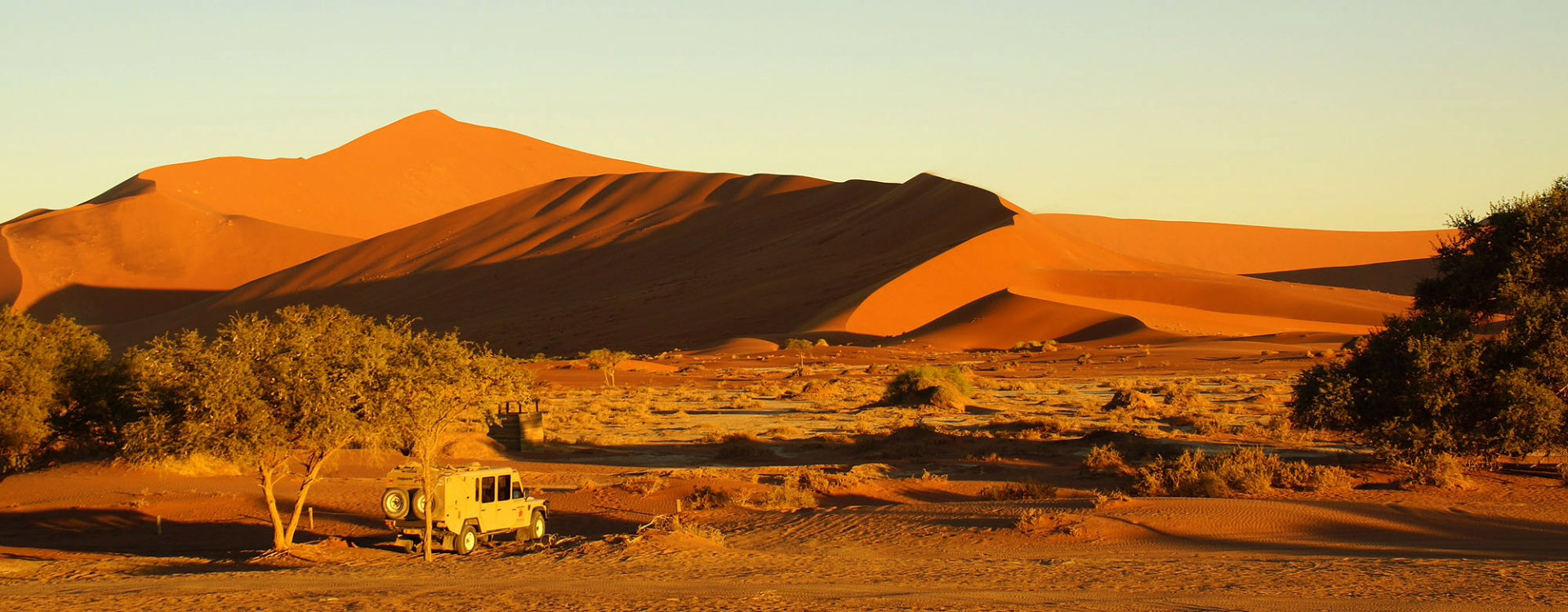
- Namibia Travel Requirements
Travel Requirements
Travellers often get confused while planning for a Namibia Safari. It’s important to know all information on Namibia Travel Requirements , so that you have enjoy your days in Namibia hassle-free.
Below, we have provided every bit of information on Travel Requirements To Namibia , that clears your confusion. From visa requirements to flight information, we have covered every possible aspect for Namibia Safari .
Quick Navigation Links
Namibia travel requirements at a glance, flight updates to namibia, passport requirement, visa requirement, types of visas that namibia offers, vaccine requirements for namibia, travel insurance for namibia tours, currency and money matters, transportation and driving requirements, travel safety requirements for namibia, namibia travel restriction for 2023-24, emergencies contact numbers, final thoughts, frequently asked questions.
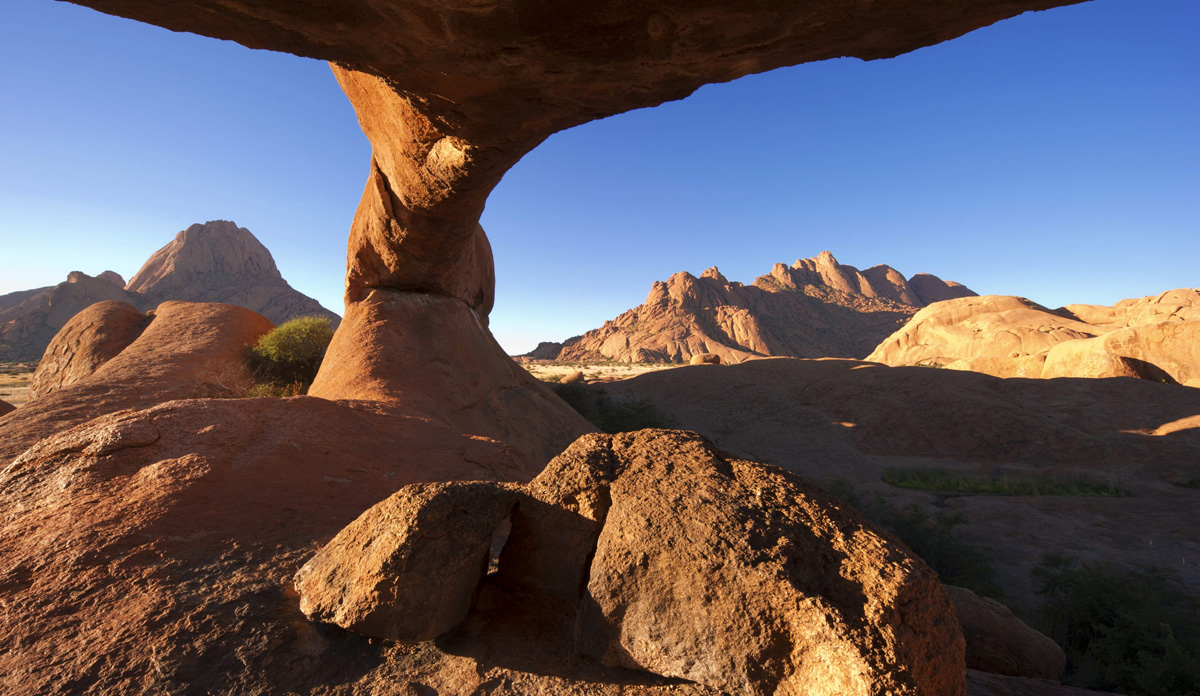
There are several airlines that operate flights to Namibia from different countries. Some of the major airlines that fly to Namibia include:
Note: The flight durations are approximate and may vary depending on factors such as weather conditions and flight routes.
Apart from the above airlines, some other airlines that operate flights to Namibia include Air France, Lufthansa, Turkish Airlines, and Emirates.
- Some airlines offer connecting flights to Namibia through their hubs. For example, Emirates offers flights to Namibia with a layover in Dubai.
- The primary airport in Namibia is Hosea Kutako International Airport (WDH), located approximately 45 kilometers east of Windhoek.
- Some airlines also offer domestic flights within Namibia, such as Air Namibia and Westair Aviation. Domestic airports in Namibia include Eros Airport in Windhoek and Walvis Bay Airport.
- It is recommended to book flights well in advance to ensure availability and to possibly secure lower fares.
- During peak travel periods, such as during the holiday season, flights to Namibia may be in higher demand and prices may increase accordingly.
- Some airlines may offer discounts or promotions for travel during certain times of the year. It's always worth checking airline websites or signing up for their newsletters to stay informed of any special offers.
- It is important to have a valid passport and any necessary visas before booking flights to Namibia. Some nationalities may require a visa to enter Namibia, while others may be eligible for visa-free entry for a limited period of time.
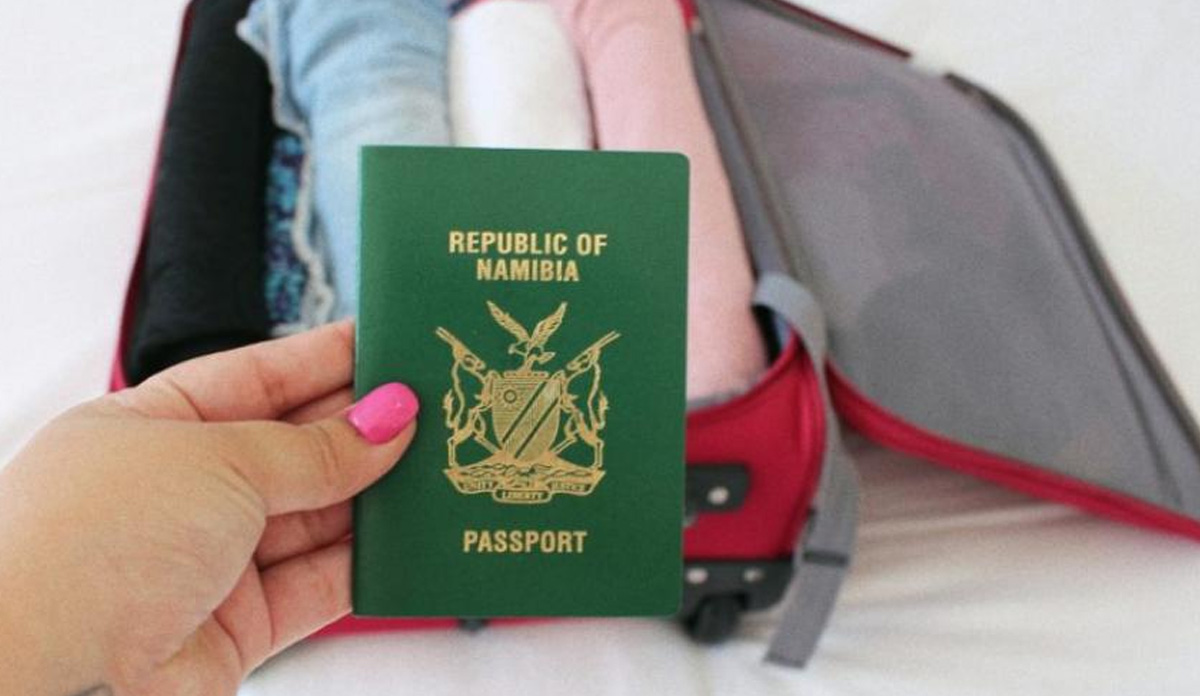
Foreign visitors to Namibia generally need a passport that is valid for at least six months beyond their date of entry. In addition to a passport, visitors may also need a visa, depending on their country of origin.
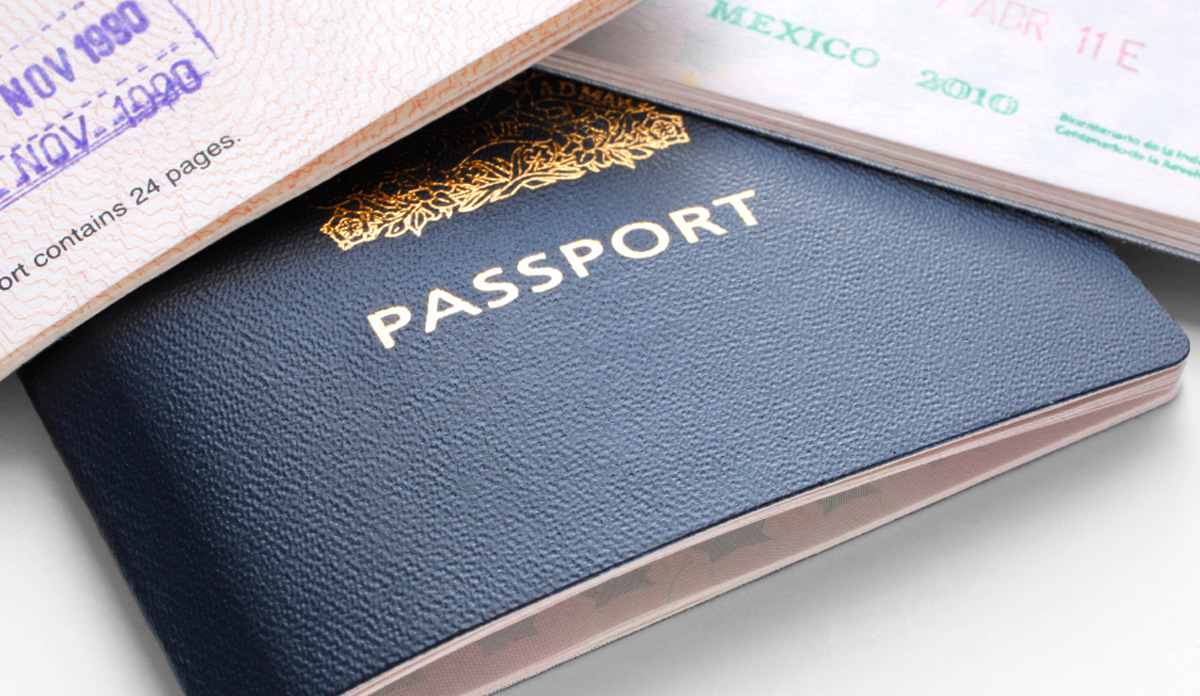
The visa requirements for Namibia depend on your country of citizenship. Here is some general information about visa requirements for Namibia:
Visa-Exempt Countries:
Citizens of certain countries do not need a visa to enter Namibia for tourism or business purposes. These countries include the United States, Canada, the United Kingdom, Australia, New Zealand, and many other countries. Citizens of these countries can enter Namibia for up to 90 days without a visa.
Visa-on-Arrival:
Citizens of some countries can obtain a visa upon arrival in Namibia. These countries include China, India, Russia, and many other countries. A visa-on-arrival is valid for up to 90 days.
Visa Required:
Citizens of certain countries do require a visa to enter Namibia. These countries include Afghanistan, Iran, Iraq, and several African countries. If you are a citizen of one of these countries, you will need to apply for a visa before travelling to Namibia.
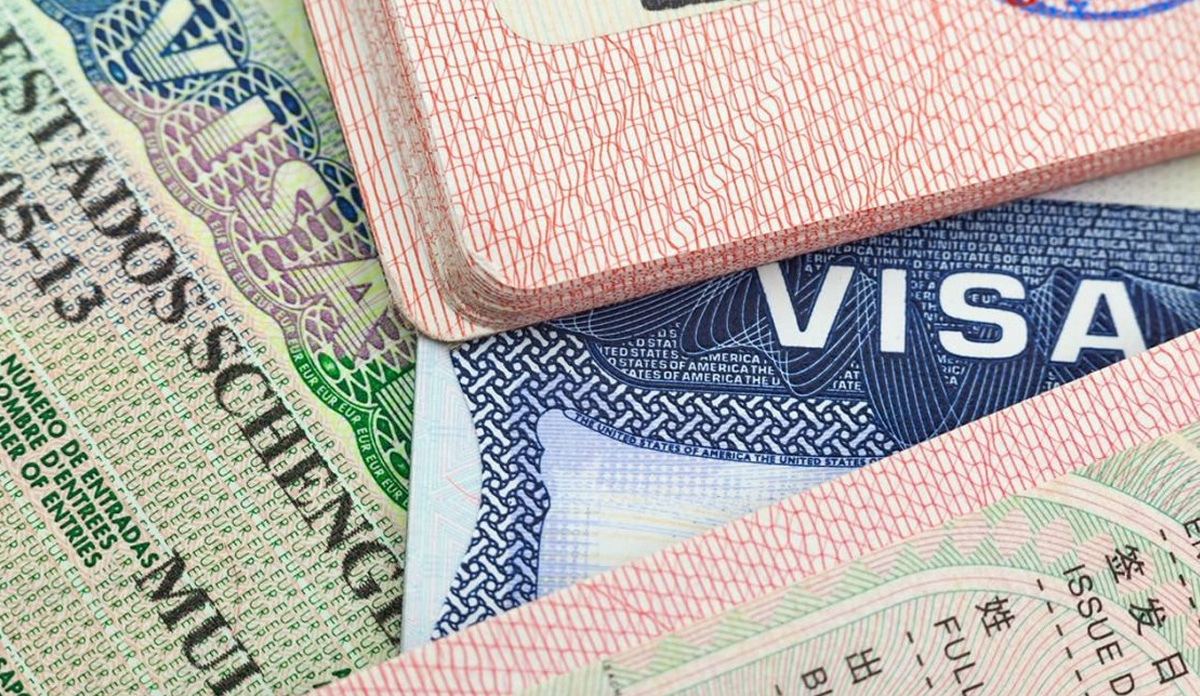
Namibia offers different types of visas depending on the purpose of your visit. Here are some of the most common types of visas for Namibia:
Tourist Visa:
This type of visa is for individuals who plan to visit Namibia for tourism or leisure purposes. It is usually valid for up to 90 days.
Business Visa:
This type of visa is for individuals who plan to visit Namibia for business purposes, such as attending meetings, conferences, or exploring investment opportunities. It is usually valid for up to 90 days. A business Visa is for those who plan to visit Namibia for business purposes, like attending meetings, conference or any other official events.
This type of visa is for individuals who have secured employment in Namibia and plan to work in the country. It is usually valid for up to 12 months and can be renewed.
Study Visa:
This type of visa is for individuals who plan to study in Namibia, whether it be for a short-term course or a full degree program. It is usually valid for the duration of the course or program.
Transit Visa:
This type of visa is for individuals who are passing through Namibia on their way to another destination. It is usually valid for up to seven days.
Visa Requirement For Namibia At A Glance
What is the processing time for namibia visas.
The processing time for Namibia Visa is 10-15 days. However, the processing time can vary depending upon like, The Types of visa, the number of applicants and so on. For this reason, advise you apply well in advance.

Documents Required For Namibia Visa
According to the official Namibia visa application requirements, below is a list of documents, which you need to keep in hand, before applying for a Namibia Visa .
- A passport must be valid for at least six months,
- Confirmed air-tickets
- Proof of accommodation such hotel bookings
- 2 photographs as per specification.
- A fully filed application form

Cost Of Namibia Visa
The cost of Namibia Visa depends upon two factors, the types of visas you chose and your nationality.
Travellers coming to Namibia, from other countries, need to be fully vaccinated with the following vaccines –
- Dengue - Although Dengue is not a big concern in Namibia, still visitors are advised to take a vaccine against this disease.
- DTP - Vaccination against is DTP is recommended for all travellers.
- Hepatitis A & B – all travellers coming to Namibia need to take this Hepatitis A vaccine but, as it is mandatory, but the vaccine against Hepatitis B, is an optional choice for you.
- Malaria – Comparing to its neighbouring countries, Namibia has a lower risk of Malaria. In fact, some of its game reserves are totally malaria free. Still, we advise you to take anti-malaria pills and mosquito repellent with you.
- Yellow Fever - Yellow Fever is not widespread in Namibia. But if any traveller is coming from any yellow fever area, then vaccination is mandatory.
Covid – 19 protocols in Namibia
If you’re planning a Namibia Tour , you should be aware of latest Covid protocols in Namibia.
Protocols for fully vaccinated travellers
Travellers who are fully vaccinated, no need to show a negative PCR test result on arrival. And, even they don’t need to show a vaccination card or certificate on arrival.
Also, travellers coming from native country, Namibia no need to show proof of vaccination or a negative PCR test result.
Protocols for not fully vaccinated travellers
If you’re not fully vaccinated, you need to show you a negative PCR test result.
Medical treatment facilities in Windhoek
There are good medical facilities in Windhoek . Make sure you have adequate travel health insurance and accessible funds to cover the cost of any medical treatment abroad and repatriation. Even with fully comprehensive travel insurance, private hospitals in Namibia may insist on proof of payment (cash or credit card) before starting treatment.
They may also insist you pay up front, reclaiming from your insurer at a later date. Some travel insurance policies are not recognised by some Namibian hospitals, you should check with your provider if their product is accepted in Namibia before you travel and seek alternative coverage where necessary. Medical evacuation from remote areas can take time.
Travel insurance is not mandatory for Namibia Tour, but with a travel insurance that covers every perspective, will make you worry less throughout your Tours In Namibia .
Below, is a data that shows, all information at a glance on travel insurance in Namibia.
Note: The above table is just an example and the actual coverage and costs may vary depending on the insurance provider, the type of plan, and other factors. It's important to research and compare different insurance options to find the best one for your needs and budget.
The currency of Namibia is the Namibian dollar (NAD), which is pegged to the South African rand (ZAR) at a 1:1 exchange rate. The South African rand is also accepted as legal tender in Namibia, but other currencies are generally not accepted.
You can exchange foreign currency at banks, exchange bureaus, and some hotels and restaurants. Credit cards are widely accepted in major cities, but may not be accepted in more rural areas. It is important for you to have enough cash on hand during your Namibia Tours for smaller purchases and to tip service staff.
Before planning Namibia Tour , you should have some ideas on, what is the daily spending of travellers in Namibia during their trips –
Note: The above table is just an example and the actual costs may vary depending on various factors such as the type of accommodation, the type of food and activities, and personal preferences. It's important to have a realistic budget and plan accordingly to ensure a comfortable and enjoyable Namibia Holiday .
If you're planning to explore Namibia by car, you'll need to have a valid driver's license and be at least 18 years old. If you're driving with a foreign driver's license, it's recommended to obtain an International Driving Permit (IDP) to ensure that you can legally drive in Namibia. Namibians drive on the left side of the road, which may take some adjustment if you're used to driving on the right side.
It's also important to ensure that you have adequate insurance coverage for your rental car or personal vehicle. Most rental car companies in Namibia offer insurance coverage, but it's recommended to check the policy details and coverage limits before renting a car. If you're driving your own vehicle, make sure that your insurance policy covers international travel.
If you're not comfortable driving in Namibia, there are also other transportation options available, such as taxis, buses, and guided tours. It's recommended to book transportation in advance, especially during peak travel periods.
Namibia is generally a safe destination for travelers, but it's always important to take basic safety precautions to ensure a safe and enjoyable trip. Here are some travel safety requirements to keep in mind during Namibia Tour .
Get comprehensive travel insurance:
It's highly recommended to purchase comprehensive travel insurance that covers medical emergencies, accidents, theft, and trip cancellation. Make sure to read the policy carefully and understand what is covered and what is not.
Stay aware of your surroundings
Be aware of your surroundings and stay alert for any suspicious activity, especially in crowded areas or public transportation. Avoid walking alone at night or in isolated areas.
Carry your important documents with you:
Keep your passport, travel documents, and other important items (such as your credit cards and cash) with you at all times, and secure them in a money belt or pouch.
Avoid public demonstrations and protests:
It is important to stay informed about the current political and social climate in Namibia and to avoid participating in or attending any public demonstrations or protests.
If you find yourself near a protest or demonstration, it is advisable to leave the area immediately and seek safety.
Follow local laws and customs:
Make sure to follow local laws and customs, especially when it comes to wildlife protection and conservation. It's also important to dress modestly and appropriately, especially in rural areas.
Taking photographs-
In Namibia, taking photographs of Government offices, personalities and military sites, is not allowed. If you’re want to take any photographs during your Holidays In Namibia , ask your tour guide, before clicking.
As of March 2023, Namibia has implemented the following travel restrictions:
COVID-19 Restrictions:
Namibia has implemented various restrictions related to COVID-19. All travellers are required to present a negative COVID-19 PCR test taken within 72 hours of departure. Unvaccinated travellers must undergo a mandatory quarantine period of 7 days, while fully vaccinated travellers are exempt from quarantine.
Visa Requirements:
Visitors from certain countries are required to obtain a visa to enter Namibia. The visa can be obtained from Namibian embassies or consulates in their home countries or upon arrival in Namibia.
Border Restrictions
Namibia's land borders with South Africa and Botswana are currently open for commercial and private travel. However, travellers are advised to check the latest travel advisories before making any travel plans.
Wildlife Restrictions
Namibia is known for its rich wildlife, but visitors are required to adhere to strict wildlife protection laws. It is illegal to kill or hunt wildlife, and visitors must follow the regulations set by the Ministry of Environment, Forestry, and Tourism.
Travel Insurance:
Travellers are strongly advised to purchase comprehensive travel insurance that covers medical expenses, trip cancellations, and any other unforeseen circumstances that may arise during their Holidays In Namibia .
Currency Restrictions
There are no restrictions on the amount of foreign currency that can be brought into Namibia, but travelers must declare any amount exceeding NAD 25,000 or its equivalent in foreign currency upon arrival.
Depending on your need during your Namibia Tour , you must keep the following contact number with you-
- Travel operator
- Insurance provider
- Family and Friends
Other emergencies number : Fire and Rescue Services – Call 112 (from mobile) and 612 211 111 (from landline)
Final Thought
In conclusion, Namibia is a beautiful country that offers a unique and memorable travel experience. It is important to be aware of the travel requirements before planning your trip to ensure a hassle-free and enjoyable experience. By following the Namibia Travel Requirements , you can have a safe and unforgettable Namibia Safari Tours .
In summary, the Namibia Travel Requirements will always depend on what you want to see and what you want to experience on your safari.
While the dry season turns the bush into a beautiful golden-red landscape just after the rains and is optimal for safari, the wet season is considered ideal for those who want to experience Zambia Safaris at affordable prices.
So, choose your best time as per your taste, preferences and convenience.
Related Namibia Travel Guide
We think you’ll love.
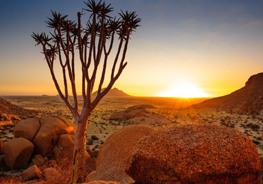
Best Time To Visit
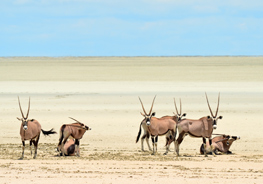
Safari Cost
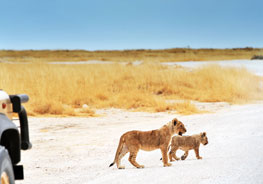
Things To Do

Travel Facts
Frequently asked questions, do i need a visa to visit namibia.
Citizens of most countries, including the US, Canada, UK, Australia, and EU member states, do not need a visa for stays of up to 90 days in Namibia. However, some countries do require a visa. Check with the Namibian embassy or consulate in your home country for specific requirements.
Can I get a visa on arrival in Namibia?
No, visas are not issued on arrival in Namibia. You must obtain a visa before you travel to Namibia.
Do I need to have a yellow fever vaccination to enter Namibia?
If you are travelling to Namibia from a country where yellow fever is endemic, you will be required to show proof of vaccination against yellow fever. Check with the Namibian embassy or consulate in your home country for specific requirements.
What documents do I need to enter Namibia?
You will need a passport with at least six months of validity beyond your planned stay in Namibia. You may also be asked to show proof of onward travel, such as a return ticket or itinerary.
Is travel insurance required for Namibia?
Travel insurance is not a legal requirement for entry into Namibia, but it is highly recommended to protect yourself against unexpected medical expenses, trip cancellations, and other unforeseen events.
Can I drive in Namibia with my foreign driver's license?
Yes, visitors can drive in Namibia with a valid foreign driver's license, as long as it is in English and/or accompanied by an international driver's license.
What is the local currency in Namibia?
The currency in Namibia is the Namibian dollar (NAD), which is pegged to the South African rand (ZAR) at a 1:1 exchange rate. South African rand is also widely accepted in Namibia.
Are credit cards widely accepted in Namibia?
Credit cards, especially Visa and Mastercard, are widely accepted in Namibia, especially in larger cities and tourist areas. However, it's always a good idea to carry some cash with you for smaller purchases and in more remote areas.
What is the time difference between Namibia and my home country?
Namibia is in the Central African Time (CAT) zone, which is two hours ahead of Coordinated Universal Time (UTC+2). The time difference will depend on where you are travelling from.
Is it safe to travel to Namibia?
Namibia is generally a safe country to travel to, with a low crime rate and a stable political environment. However, like any destination, travellers should exercise common sense and take precautions to stay safe.
Do I need any vaccinations to visit Namibia?
There are no mandatory vaccinations required to enter Namibia, but some vaccinations are recommended, such as those for hepatitis A and B, typhoid, and rabies. Check with your doctor or a travel health clinic for the latest recommendations.
What is the maximum amount of currency I can bring into Namibia?
There is no limit to the amount of currency you can bring into Namibia but amounts exceeding NAD 25,000 or equivalent must be declared upon arrival.
Can I bring medication with me to Namibia?
Yes, you can bring medication with you to Namibia, but you should carry a doctor's prescription or a letter from your doctor explaining why you need the medication. Some medications are considered controlled substances in Namibia, so it's important to check with the Namibian embassy or consulate in your home country for specific requirements.
We are thrilled to help you plan your perfect safari holiday
We'd be delighted to help you with any questions you have about properties & safaris. Please fill in the form below so that we can help you create your perfect safari holiday.
Feel free to give us a call or send us an e-mail:
Meet us on Social Media
Start planning your tailored african safari, expert safari knowledge.
With decades of expertise, we're your trusted safari guides, ensuring every moment exceeds your expectations.
Tailor-made African Safaris
Tailored to your preferences, our African Safaris guarantee an adventure perfectly suited to your desires.
Long-term Relationships
Our enduring partnerships across Africa provide exclusive access and authentic experiences.
Carefree Travel
Leave your worries behind and accept carefree travel with Falcon Safaris, where every detail is handled to perfection.
Our Travelers Say

We travelled with Falcon Safaris in Zimbabwe and Botswana for 16 days. Falcon designed a wonderful trip with private guide to the most interesting sites in both countries. The organization of the whole trip was excellent, flights within the country, accommodation and activites. The guides were very knowledgable and told us a lot about the countries, their history, people, economy and much more. We visited the Great Zimbabwe Ruins, the Victoria Falls Tour and a number of national parks in both countries. Rhino tracking was a real adventure! We had tremendous further game drives and saw very many animals - we did the Big Five. We had much more Victoria Falls Activities than planned and enjoyed very much.We strongly recommend Falcon Safaris to everyone planning a trip to Southern Africa and East Africa.
Wonderful trip to Zimbabwe and Botswana with excellent organization and very competent guides
Our Consultant Vimbai was very helpful and accommodating. We stayed at the Elephant hills hotel which was nothing short of amazing.Our activities included a helicopter flight, dinner cruise as well as a morning game drive. All the activities were absolutely amazing.
Exceptional!
We worked with Gertrude to schedule and organize everything and she did an excellent job. I asked a lot of questions via e-mail and she answered everyone in a timely helpful manner. Our guide at Victoria Falls was also great. He met us at the airport, provided a thoughtful tour of the Falls and got us to our next guide in Botswana. Our lodgings at River View Lodge were just as described- very comfortable and excellent food. All the staff were so pleasant and helpful. If I had to do it again I would arrange a morning boat ride as well. We only did the sunset boat rides and they were the high point of our entire trip- we saw so many animals and our guide was very knowledgeable. Just a great experience. Our lodgings at Oddball's Enclave was rustic and we loved it. So great to disconnect from the world for a bit. Leo, our guide, was the best - got us out and about, saw fantastic wildlife and got back to camp safely each time. Doc manages the camp so well. This whole trip was planned and organized by Falcon Safaris and we could not have been happier.
Fabulous, well planned trip
Falcon safaris have given my the correct advice with excellent service. The only suggestion will be to work closer with the lodges to confirm bookings as soon as possible. We have booked and pay our deposit a year in advance. We have only receive our final convermation from Chobe Safari lodge a week before departure. I do realize its not within your controle but with limit alternatives and a group of 14 people it becomes an issue to find alternative accomodation if the booking was cancelled.
Excellent and efficient service
Explore our africa with customize your tour.
We love Africa's diversity and create amazing trips for you. With 30+ years of experience, we customize every trip just for you.
Enquire Your Hotel
Enquire your activity, enquire now.
Not Ready To Start Yet? Send Your Details, Our Experts Will Be In Touch For A Successful African Destinations Visit
Enquire Your HouseBoat
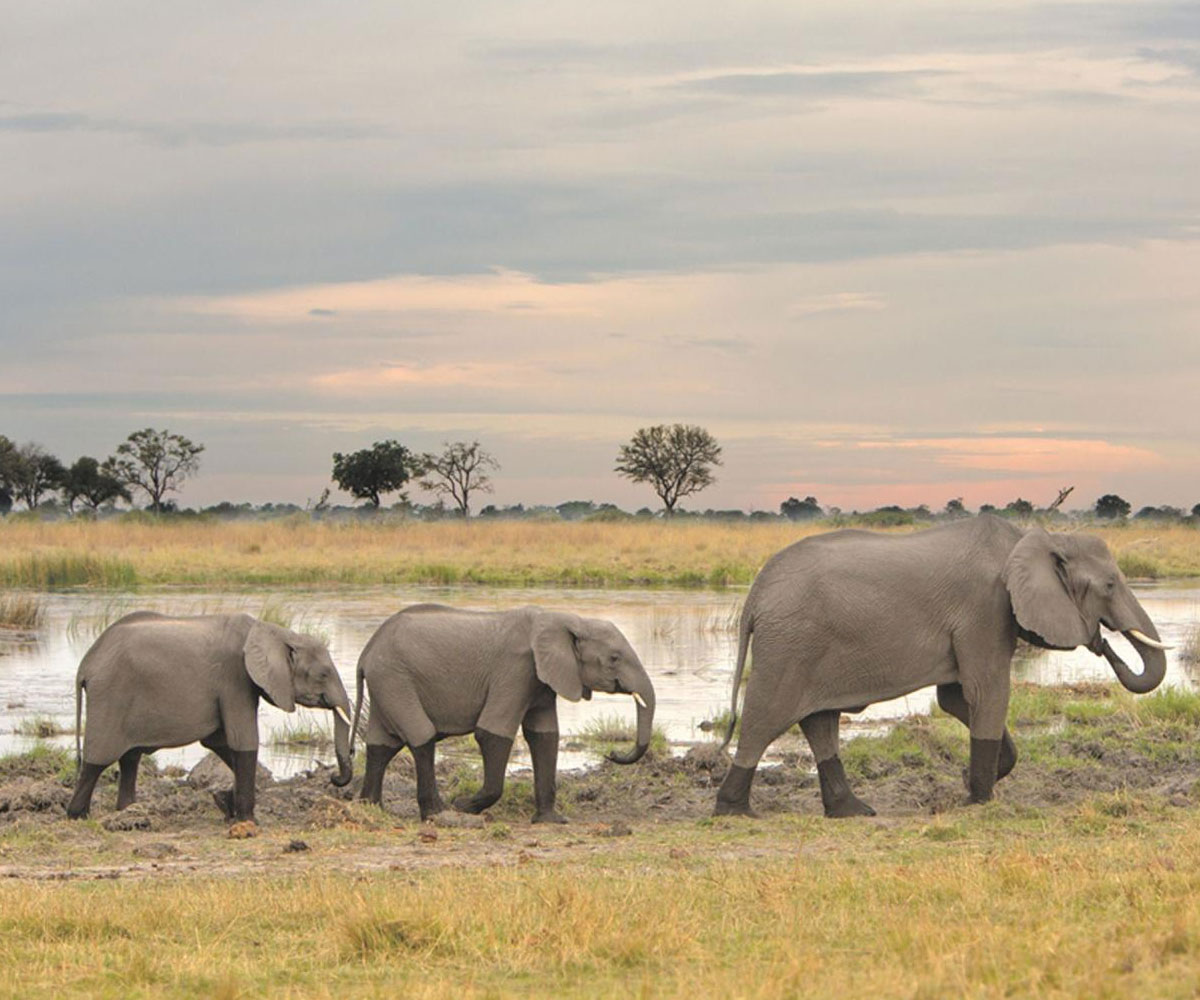

Visa Requirements

To enter Namibia a passport valid for at least 6 months from date of entry is required. Kindly ensure that you have at least 3 blank pages for entry and exit stamps. A valid return ticket is also required. Entry into Namibia will be allowed up to a maximum of 90 days. Extensions can however be applied for from the Ministry of Home Affairs situated in Windhoek.
Visitors from the following countries do not require visas: Australia, Angola, Armenia, Austria, Azerbaijan, Belarus, Botswana, Belgium, Brazil, Canada, Cuba, Denmark, Finland, France Germany, Hong Kong, Ireland, Italy, Iceland, Japan, Kazakhstan, Kenya, Kyrgyzstan, France, Liechtenstein, Lesotho, Luxembourg, Malaysia, Macau SAR, Malawi, Mauritius, Moldova, Mozambique, Norway, Netherlands, New Zealand, Portugal, Republic of Ireland, Russia, Scandinavian countries, Singapore, South Africa, Spain, Seychelles, Switzerland, Spain, Swaziland, Sweden, Tajikistan, Tanzania, Turkmenistan, Ukraine, Uzbekistan,United Kingdom, USA, Zambia and Zimbabwe.
Visitors from the following countries can apply for a visa upon arrival in Namibia:
Belarus, Bulgaria, Cambodia, Chile, Czech Republic, Hungary, Mexico, Moldova, Nicaragua, Poland, Romania, Slovakia, South Korea, Venezuela, Vietnam, Thailand, United Arab Emirates, Singapore.
For other countries please consult with your nearest Namibia Consulate about visa requirements.
Don’t forget to book your accommodation in Namibia to avoid disappointment.
Related Pages

Sandwich Harbour 4×4 Trips

Exciting Namibia – An Introduction to Africa

Plenty of Fun to be Had in Namibia!
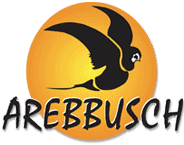
A Quick Guide to Visa Requirements for Namibia
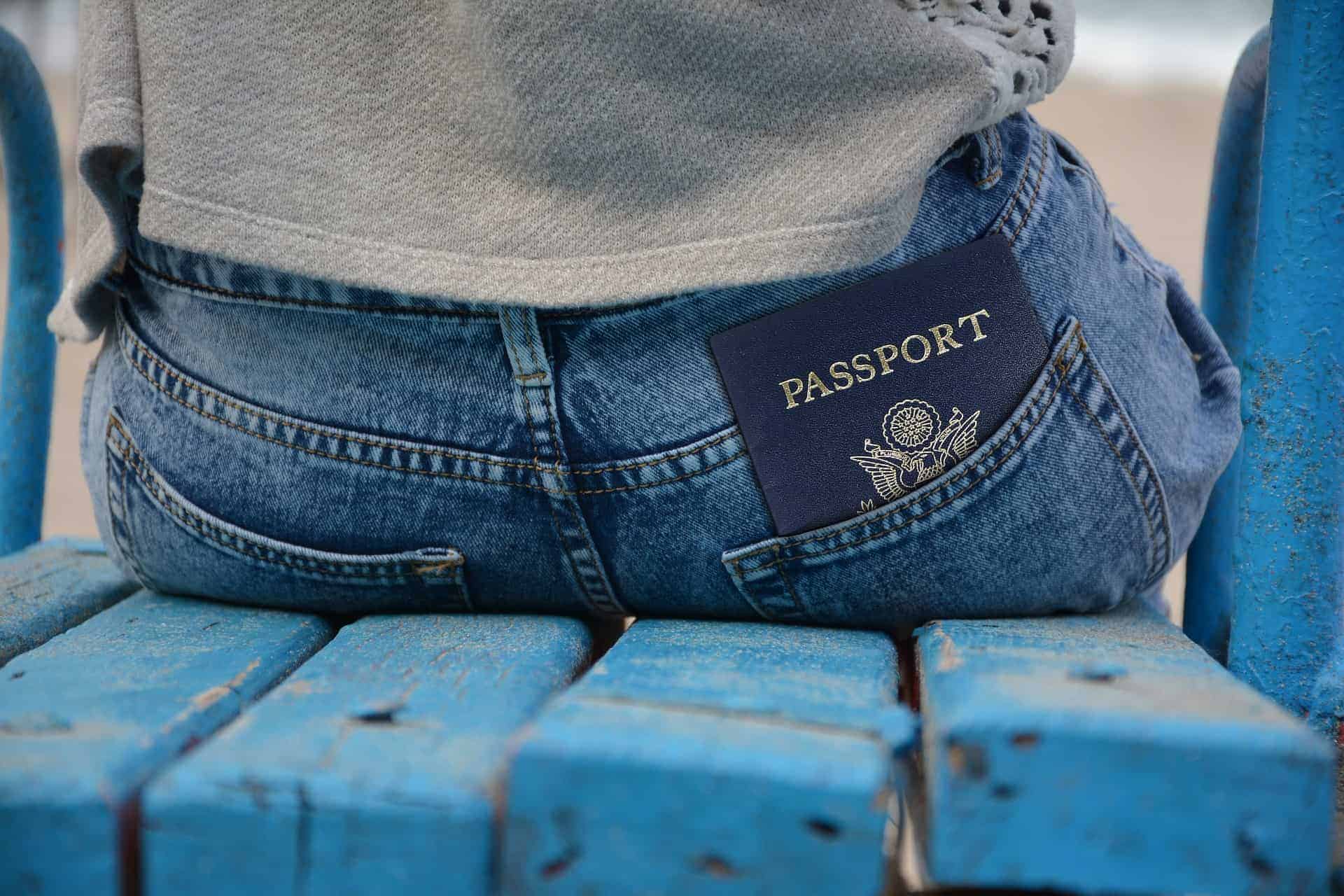
Pre-planning a trip to another country can be taxing, and the visa part of that planning can be the biggest challenge of all. You can always outsource the organization of your visa to a travel agency or specialized company, but in many instances that means almost doubling the price of the visa.
To help you out in the planning stages of your Namibia trip, here is a quick guide to visas for Namibia.
Tourist Visa on Arrival
Travelers from the following states and territories can apply for a visa on arrival at Hosea Kutako International Airport, valid for 90 days :
- Czech Republic
You must pay for the visa in Namibia, and the cost is *N$1 200.
You will need the following documents when applying for this kind of visa:
- Passport with 6 months validity beyond your departure date and at least three blank pages
- Proof of a hotel booking or an invitation letter from person(s) inviting the visitor or tour operator
- Completed via form
- Payment of any fees
- Your return ticket
- Medical insurance covering period of stay
- Yellow fever certificate if applicable
- Any other supporting documentation
Tourist Visa
Tourist visas are valid for three months and generally take three to seven days to process at the Namibian Consulate or Embassy in your country. Not all visitors to Namibia require a tourist visa – nationals from 56 countries worldwide don’t require a visa for visits of less than 90 days.
Some of these countries include:
- Most southern African countries
- New Zealand
- Netherlands
- United Kingdom
- United States of America
You can view the full list here.
You will require a passport with 6 months validity beyond your departure date and at least three blank pages.
Nationals of all other countries require a visa, which you can obtain from the Namibian embassy in your country. For those travellers needing to apply for a tourist visa, please note you will need to submit the following paperwork to process the visa:
- Your itinerary
- Copy of a round trip ticket
- Proof of accommodation reservation for your stay in Namibia
- Travel medical or health insurance
- Proof of substantial funds for the duration of stay in Namibia, (3 months bank statement / bank guarantee)
- Payment confirmation for a visa
- Documentation detailing the purpose and duration of the visit
- Copy of a yellow fever vaccination certificate where applicable
Remember that a Namibia Tourist Visa does not permit you to work – this includes volunteer work. You’ll need a work, digital nomad visa, or business visa if you intend to visit Namibia for this purpose.
There are extra requirements for those travelling with children under the age of 18.
Work and Business Visa
If you plan on working for a Namibian company or you are participating in unpaid volunteer work, you will need a work or business visa.
You apply for the visa with the Embassy, but they’re issued at the Ministry of Home Affairs, Immigration, Safety and Security in Windhoek.
Study and work visas can be applied for a maximum period of 6 months .
A work visa will take about 5 weeks to process and will cost the applicant about *$1 100 for a three-month visa. The fee for a six-month visa is *$2 200.
The company you will be working or volunteering for should assist you in the visa application process. Along with the temporary work permit the applicant will also need a temporary residence permit for work purposes.
Those applying to work or volunteer in Namibia for 1 to 3 months will require the following:
- An invitation from a Namibian resident
- Visa application form
- Passport with six months validity and three blank pages
- Motivation letter from your employer
- Proof of educational qualifications
- Proof of tender/contract
- Proof of means of sustenance while in Namibia
For those who will be working in Namibia for 6 months , you need all the above as well as:
- Police clearance certificate from country of origin (for 6 months visas)
- Medical and radiological reports
If you are visiting Namibia on business, you need a business visa, even if it is to attend a conference for just a few days. Nationals from countries that don’t require a visa don’t need a business visa for short business stays in Namibia either.
To apply for a business visa, you must provide:
- Yellow fever vaccination
- A business letter from your company outlining the purpose and duration of the visit
- A business letter from the host company giving dates of travel, purpose of the trip and guarantee of sufficient funds.
Please send the completed visa application form and all the required documents by e-mail to: [email protected]
Digital Nomad Visa
In line with the global trend towards remote work, Namibia has introduced a Digital Nomad Programme , which allows you to live and work in the country for six months.
During your stay, you’re free to work, study, and travel when you hold one of these visas.
You can apply for this visa either online or via email and must attach the following documents:
- Medical certificate
- Radiological Report
- Copy of your passport
- Proof of medical insurance or comprehensive travel insurance
- Proof of income – a minimum of $2,000 per month
- Police clearance certificate
- Six months’ worth of bank statements
- Letter of employment or proof of contract (if applicable)
- Copies of relevant qualifications (recommended but optional)
Other relevant visas
Student Visa : Anybody who wishes to study in Namibia needs to apply for a study permit and visa; the necessary forms for this application process should be available at the various institutions of higher learning in Namibia, or the Namibian embassy in your country.
Transit Visa: This visa is valid for three days or less and is needed if you are just passing through the country.
New Travel Protocols for Flying into Namibia
For all air travel into Namibia from 2021 onwards, you must comply with the following:
- Confirmed accommodation at an approved tourist facility
- An itinerary for your travels
While Namibia is relatively tourist friendly as far as visas are concerned, there are a few important points to bear in mind:
It is wise to make sure you have enough open pages in your passport for the necessary stamps – access to the country can be denied if there is no space for further stamps.
Remember the 90-day limit on a tourist visa or tourist visit – while it is possible to apply for a visa extension in the country, the granting of those extensions is rare.
All documents must be in English.
Getting a visa is a process in any country, but as long as you apply for the most appropriate visa, and have all the relevant paperwork, the process can be easy and hassle free.
*Disclaimer: Information on this page is accurate and reliable at time of publication, however, while Arebbusch Travel Lodge endeavors to ensure that our site is updated regularly it may not always reflect the very latest updates, and with time some of this information may change. Accordingly, Arebbusch Travel Lodge will not be held liable for loss or inconvenience resulting from the use of outdated or incorrectly noted information.
We recommend that you clarify this information with the relevant authorities prior to finalizing your travel arrangements.
You are invited to contact us directly should you have updated information to what has been shared here so that we can make the relevant changes.
Click here to view the latest Tourism Guidelines as published by the Ministry of Environment, Forestry and Tourism.
Submit a Comment Cancel reply
Your email address will not be published. Required fields are marked *
Yes, add me to your mailing list
Submit Comment
Newsletter Signup

Search Smartraveller

Latest update
Exercise normal safety precautions.
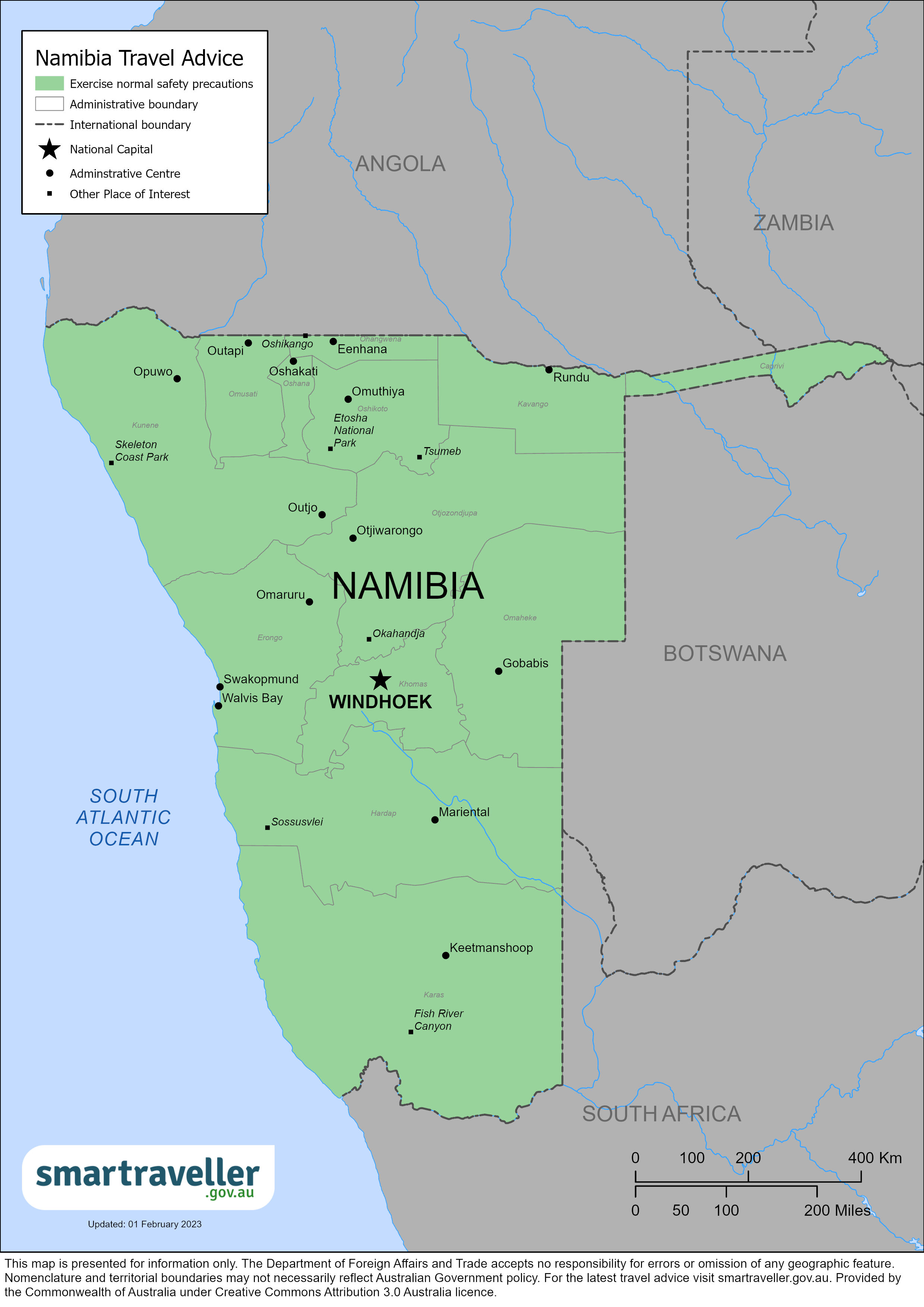
Namibia (PDF 756.88 KB)
Africa (PDF 1.68 MB)
Local emergency contacts
Fire and rescue services.
Call 112 from a mobile.
Call 61 211 111 from a landline.
Medical emergencies
Go to the nearest hospital.
Visit the nearest police station or a Tourist Protection Unit.
- Windhoek Main Police Station, phone: 61 209 4345
- Swakopmund, phone: 64 405 558
Advice levels
Exercise normal safety precautions in Namibia.
- Petty crime is common, including in urban centres. This includes pickpocketing, bag-snatching and car break-ins. Don’t leave valuables in your car. Always keep vehicle doors locked and windows up, even when moving.
- Violent crime includes muggings and robberies. Tourists have been robbed after stopping for hitchhikers or to help people. Avoid walking alone in large towns, particularly at night. Don’t pick up strangers.
- Taxi drivers have robbed travellers. Don’t hail unmarked taxis on the street. Use taxis with the Namibia Bus and Taxi Association logo. Book taxis through your hotel or a taxi company.
- Credit card skimming occurs. Always keep your card in sight. Check your statements often for fraudulent transactions.
- Flooding may happen in the rainy season from November to April. Floods can block roads. Follow local advice.
Full travel advice: Safety
- Anyone over 9 months old and travelling from a country where yellow fever is widespread must present a yellow fever vaccination certificate on arrival. Get vaccinated before you travel.
- The rate of HIV/AIDS infection is high. Take precautions if you engage in high-risk activities.
- Malaria is common in northern Namibia. Consider taking anti-malarial medication if you’re travelling to this area. Other insect-borne diseases include leishmaniasis. Use insect repellent and ensure your accommodation is insect-proof.
- Waterborne, foodborne, parasitic and other infectious diseases are common. They include typhoid, hepatitis and meningitis. Drink only boiled or bottled water. Avoid raw or undercooked food.
- Medical facilities are limited outside major urban centres. If you're seriously ill or injured, you'll need evacuation, probably to South Africa. Ensure your travel insurance covers this. Medical evacuation is expensive and hard to organise.
Full travel advice: Health
- Don't use or carry illegal drugs. Penalties for drug offences are severe. They include long prison sentences.
- Ask permission before taking photos. It's illegal to take photos of government and military sites.
- Trading endangered wildlife products like ivory and rhino horn is illegal.
- Trading diamonds and precious stones is illegal. Only buy from licensed shops.
- Same-sex relationships are legal in Namibia, but they aren't widely accepted.
Full travel advice: Local laws
- To enter Namibia, you don't need a visa if you're a tourist for up to 3 months. For other travel purposes, you'll need a visa in advance. Entry and exit conditions can change at short notice. You should contact the nearest high commission or consulate of Namibia for the latest details.
- You'll need one blank page in your passport to enter Namibia. If travelling from Namibia to South Africa, you'll need an additional two blank pages.
- If you're travelling with children, you must carry a full birth certificate and in certain circumstances an affidavit. Check the rules and requirements with the nearest Namibian Embassy, High Commission or Consulate .
- Carry your yellow fever vaccination certificate if you're coming from a country where there’s a risk of yellow fever. You’ll need it to enter Namibia.
- The official currency is the Namibian Dollar (NAD). You can also use South African rand (ZAR). You can use credit cards in major centres. ATMs are available in cities, but not always in remote areas.
- Unexploded landmines are a danger in some parts of Namibia. These include parts of the East and West Kavango Regions and Zambezi Region in the north-east, and areas near the Angolan border. Follow the advice of local authorities.
Full travel advice: Travel
Local contacts
- The Consular Services Charter details what we can and can't do to help you overseas.
- Australia has a consulate in Namibia that provides limited consular and passport services.
- For full consular assistance, contact the Australian High Commission in South Africa .
- To stay up to date with local information, follow the High Commission’s social media accounts.
Full travel advice: Local contacts
Full advice
Petty crime.
Petty crime is common, and also occurs in urban centres. This can include:
- pickpocketing
- bag-snatching
- theft from motor vehicles
Mobile phones are particularly targeted by pickpockets.
Criminals use distraction techniques, such as offering assistance, to steal money and valuables.
Car break-ins are common, especially in major urban centres such as:
Violent crime
Violent crime against foreigners includes muggings and robberies . Windhoek and Swakopmund are hotspots. The use of diversion tactics to distract possible victims is common.
Tourists have been robbed after stopping for hitchhikers or to help people.
Crime increases at night.
To protect yourself from crime:
- avoid walking alone in large towns, particularly at night
- keep car windows up and doors locked, even when moving
- don't leave valuables in your car
- don't pick up strangers
- be alert at ATMs and at fuel stations.
HIV/AIDS is common in Namibia. If you're a victim/survivor of violent crime, including sexual assault , seek immediate medical assistance.
Taxi safety
Taxi drivers have robbed travellers.
Risks are highest with unmarked taxis and those hailed on the street.
Use taxis with the Namibia Bus and Taxi Association logo or organised through your hotel or a taxi company.
Don't hail unmarked taxis on the street.
Credit card fraud
Credit card skimming has been reported.
Don't let your credit card out of your sight.
Check your statements often for fraudulent payments.
Cyber Security
You may be at risk of cyber-based threats during overseas travel to any country. Digital identity theft is a growing concern. Your devices and personal data can be compromised, especially if you’re connecting to Wi-Fi, using or connecting to shared or public computers, or to Bluetooth.
Social media can also be risky in destinations where there are social or political tensions, or laws that may seem unreasonable by Australian standards. Travellers have been arrested for things they have said on social media. Don't comment on local or political events on your social media.
More information:
Cyber security when travelling overseas
Civil unrest and political tension
Demonstrations and protests.
Public protests and demonstrations can turn violent.
To protect yourself during periods of unrest:
- monitor the news for planned or possible unrest
- avoid affected areas
- follow the advice of local authorities
More information:
- Demonstrations and civil unrest
Terrorism is a threat worldwide.
Tours and adventure activities
Transport and tour operators don't always follow recommended safety or maintenance standards.
If you plan to do an adventure activity :
- check if your travel insurance policy covers it
- check operators' credentials and safety equipment before booking
- use reputable, registered tour operators
- ask about and insist on minimum safety requirements
- always use available safety gear, such as life jackets or seatbelts
If proper safety equipment isn't available, use another provider.
Climate and natural disasters
Flooding may occur in the rainy season from November to April.
Roads can become blocked.
To protect yourself if a natural disaster or severe weather occurs:
- secure your passport in a safe, waterproof location
- monitor local media and other sources
- consider moving to higher ground
- keep in contact with friends and family
- Global Disaster Alert and Coordination System
Travel insurance
Get comprehensive travel insurance before you leave.
Your policy needs to cover all overseas medical costs, including medical evacuation. The Australian Government won't pay for these costs.
If you can't afford travel insurance, you can't afford to travel. This applies to everyone, no matter how healthy and fit you are.
If you're not insured, you may have to pay many thousands of dollars up-front for medical care.
Some Namibian medical and emergency facilities don't recognise all travel insurance policies. Ask your insurer if their product is recognised in Namibia before you buy it.
Carry a copy of the policy and your insurer's emergency phone number.
Physical and mental health
Consider your physical and mental health before you travel, especially if you have an existing medical condition.
See your doctor or travel clinic to:
- have a basic health check-up
- ask if your travel plans may affect your health
- plan any vaccinations you need
Do this at least 8 weeks before you leave.
If you have immediate concerns for your welfare, or the welfare of another Australian, call the 24-hour Consular Emergency Centre on +61 2 6261 3305 or contact your nearest Australian Embassy, High Commission or Consulate to discuss counselling hotlines and services available in your location.
- General health advice
- Healthy holiday tips (Healthdirect Australia)
Medications
Not all medication available over the counter or by prescription in Australia is available in other countries. Some may even be considered illegal or a controlled substance, even if prescribed by an Australian doctor.
If you plan to bring medication, check if it's legal in Namibia. Take enough legal medicine for your trip.
Carry a copy of your prescription or a letter from your doctor stating:
- what the medication is
- your required dosage
- that it's for personal use
Health risks
The rate of HIV/AIDS infection in Namibia is high.
Take precautions if you engage in activities that expose you to a risk of infection.
Insect-borne diseases
If you're travelling from a country where yellow fever is widespread, you'll need a valid yellow fever certificate to enter Namibia. This does not apply to a child aged under 9 months. If you can't show proof of vaccination, authorities may not let you enter Namibia. You can't get vaccinated on arrival.
Malaria is common in northern Namibia.
Other insect-borne diseases include:
- leishmaniasis
To protect yourself from disease:
- make sure your accommodation is insect-proof
- use insect repellent
- wear long, loose, light-coloured clothing
- consider taking medicine to prevent malaria
Seek medical advice if you have a fever, muscle pain, rash or severe headache.
Other health risks
Waterborne, foodborne, parasitic and other infectious diseases are common. These include:
- tuberculosis
Serious outbreaks sometimes occur.
To protect yourself from illness:
- drink boiled water or bottled water with sealed lids
- avoid ice cubes
- avoid raw and undercooked food, such as salads
- don't swim in fresh water
- always check with local authorities before swimming in waters
- avoid contact with dogs and other mammals
If you're bitten or scratched by an animal, seek medical help straight away.
Get medical advice if you have a fever or diarrhoea.
Medical care
Medical facilities.
Medical facilities are limited outside major urban centres.
Private hospitals in major urban centres are better equipped.
You'll need to pay cash before doctors and hospitals will treat you. Your insurer may be able to repay you later if you're covered.
If you become seriously ill or injured, you'll need to be evacuated to South Africa or another place with better facilities. Medical evacuation can be very expensive.
You're subject to all local laws and penalties, including those that may appear harsh by Australian standards. Research local laws before travelling.
If you're arrested or jailed, the Australian Government will do what it can to help you under our Consular Services Charter . But we can't get you out of trouble or out of jail.
If you're detained or arrested, Namibian authorities may not contact the Australian Government straight away.
Ask officials to call the Australian High Commission in South Africa, or the Australian Consulate in Windhoek.
Police resources are varied throughout Namibia.
Penalties for drug offences are severe and include long jail sentences.
- Carrying or using drugs
Other crimes
In Namibia, it's illegal to:
- take photos of government and military sites. Ask local officials if in doubt
- trade in endangered wildlife products such as ivory and rhino horn
Penalties are severe for illegal trading in diamonds and precious stones. Only buy diamonds and precious stones from licensed shops.
- Wildlife trade
Australian laws
Some Australian criminal laws still apply when you're overseas. If you break these laws, you may face prosecution in Australia.
- Staying within the law and respecting customs
Dual citizenship
If you're a dual citizen, this limits the consular services we can give if you're arrested or detained.
- Dual nationals
Local customs
Same-sex relationships are legal in Namibia, but not widely accepted. Public displays of affection may cause offence. Some sexual relations between men are criminalised, but generally not enforced.
- Advice for LGBTI travellers
Visas and border measures
Every country or territory decides who can enter or leave through its borders. For specific information about the evidence you'll need to enter a foreign destination, check with the nearest embassy, consulate or immigration department of the destination you're entering.
Tourists can visit for up to 3 months without a visa.
For other situations, you'll need to get a visa in advance.
Entry and exit conditions can change at short notice. Contact a consulate-general of Namibia or the Ministry of Home Affairs and Immigration for details about visas, currency, customs and quarantine rules.
Make sure the correct visa and entry period is stamped in your passport, even if you're transiting.
Check your visa before leaving the immigration counter.
You may be detained or fined if you don't follow visa or immigration requirements.
Border measures
You need a valid yellow fever vaccination certificate to enter Namibia if you're arriving from a country where yellow fever occurs.
- Countries with a risk of yellow fever
Other formalities
To prevent the spread of Ebola virus disease (EVD) , passengers travelling from EVD-affected countries are screened on arrival.
Travel via South Africa
If you're travelling through South Africa, you must meet South African entry and transit requirements.
- Travel advice for South Africa
Travel with children
If you're travelling with children you must carry:
- a full birth certificate that identifies their parents
- an affidavit from any absent parents giving consent for the child to travel ( unless both parents are accompanying the child )
The affidavit must be less than 3 months old and include:
- the signatures of both parents
- full names, addresses, phone numbers and passport details of the child and both parents (as listed on the birth certificate)
- travel destinations of the parent and children
- a certified copy of any absent parent's passport.
If you don't have valid documents, authorities may deport you or stop you boarding your flight.
Check your documents meet these requirements with the nearest Namibian High Commission, Embassy or Consulate .
To enter Namibia, you'll need one blank page in your passport. If you're travelling from Namibia to South Africa, you'll need another two blank pages.
Some countries won't let you enter unless your passport is valid for 6 months after you plan to leave that country. This can apply even if you're just transiting or stopping over.
Some foreign governments and airlines apply the rule inconsistently. Travellers can receive conflicting advice from different sources.
You can end up stranded if your passport is not valid for more than 6 months.
The Australian Government does not set these rules. Check your passport's expiry date before you travel. If you're not sure it'll be valid for long enough, consider getting a new passport .
Lost or stolen passport
Your passport is a valuable document. It's attractive to people who may try to use your identity to commit crimes.
Some people may try to trick you into giving them your passport. Always keep it in a safe place.
If your passport is lost or stolen, tell the Australian Government as soon as possible:
- In Australia, contact the Australian Passport Information Service .
- If you're overseas, contact the nearest Australian embassy or consulate .
Passport with 'X' gender identifier
Although Australian passports comply with international standards for sex and gender, we can’t guarantee that a passport showing 'X' in the sex field will be accepted for entry or transit by another country. Contact the nearest embassy, high commission or consulate of your destination before you arrive at the border to confirm if authorities will accept passports with 'X' gender markers.
LGBTI travellers
The official currency is the Namibian Dollar (NAD).
You can also use South African rand (ZAR).
Declare amounts more than NAD50,000 when you arrive and leave Namibia. This covers all forms of currency, not only cash.
In major centres, credit cards are accepted and ATMs are available. This may not be the case in remote areas. Ask your bank if your ATM card will work in Namibia.
Local travel
Unexploded landmines and remnants of war are a danger in:
- East and West Kavango
- the Zambezi regions of north-eastern Namibia
- areas bordering Angola
Use main routes in these regions.
Driving permit
To drive in Namibia, you need a valid Australian driver's licence
Though not mandatory you may be requested to show a valid International Driving Permit (IDP)
You must obtain your IDP before leaving Australia.
Road travel
Driving can be dangerous in Namibia.
Hazards include:
- poor local driving practices
- poor street lighting
- poorly maintained vehicles
- pedestrians, wild animals and livestock on roads
Roads between main urban centres are good, but they're usually unsealed in rural areas.
Gravel and sandy roads, flash flooding and water-damaged roads are driving hazards.
Tourists have had accidents because they were driving too fast on unfamiliar roads.
Most vehicle insurance policies only cover accidents involving other vehicles or animals.
Check your insurance policy covers you for accidents on unsealed roads and single-vehicle accidents.
To reduce your risks while driving:
- check local traffic laws and practices
- be aware of animals and pedestrians on roads
- travel with sufficient fuel, water and emergency provisions in desert areas
- Driving or riding
Motorcycles
Check with your travel insurer whether your policy covers you when using a motorbike, quad bike or similar vehicle.
Always wear a helmet.
Use registered taxis, preferably arranged through your hotel.
To protect yourself if you need to take a taxi:
- avoid hailing taxis on the street
- don't share taxis with strangers
- always sit in the back seat
Public transport
Avoid public transport where possible.
Vehicles are often poorly maintained.
Local buses don't follow permanent routes.
DFAT doesn't provide information on the safety of individual commercial airlines or flight paths.
Check Namibia's air safety profile with the Aviation Safety Network.
Emergencies
Depending on what you need, contact your:
- family and friends
- travel agent
- insurance provider
Always get a police report when you report a crime.
Your travel insurer should have a 24-hour emergency number.
Consular contacts
Read the Consular Services Charter for what the Australian Government can and can't do to help you overseas.
Australia has a consulate in Namibia. It provides limited consular and passport services.
You can also get full consular and passport help from the Australian High Commission in South Africa.
Australian Consulate, Windhoek
56 Chalcedoon Street PO Box 86491, Eros Windhoek, Namibia Phone: (+264) 61 300 194 Mobile: (+264) 81 283 4629 Email: [email protected]
Australian High Commission, Pretoria
292 Orient Street Pretoria Republic of South Africa Phone: +27 0 12 423 6000 Fax: +27 0 12 342 8442 Email: [email protected] Website: southafrica.embassy.gov.au Facebook: Australian High Commission in South Africa Twitter: @AuHCSouthAfrica
Check the High Commission website for details about opening hours and any temporary closures.
24-hour Consular Emergency Centre
In a consular emergency, if you can't contact an embassy, call the 24-hour Consular Emergency Centre on:
- +61 2 6261 3305 from overseas
- 1300 555 135 in Australia

Travelling to Namibia?
Sign up to get the latest travel advice updates..
Be the first to know official government advice when travelling.

Foreign nationals exempted from visa requirements when traveling to Namibia for a maximum period of 90 days per year
Nationals from the countries listed below with whom Namibia has Visa Exemption Agreements are not required to obtain visa and will be allowed to enter into Namibia and get Visitor´s Entry Permit (VEP) endorsement stamps at the Port of entry for the following reasons:
- Holiday/vacation
- Visiting friends or relatives
- Attending workshops (not as facilitator)
- Attending meetings
- Exploring of business opportunities
- Medical treatment
- Any other purpose other than employment of any kind
Business persons coming to Namibia to work at their subsidiary companies, for example, give training to local staff, conduct audits of their companies, volunteer work of any kind except Conservation tourism etc. are required to apply for employment permits/work visas in terms of Section 27 of the Immigration Control Act (Act No. 7 of 1993) regardless of whether they are citizens of countries which are exempted.
Conservation tourism in Namibia does not require Employment Permits. See Media Release on the website of the Ministry of Home Affairs, Immigration, Safety and Security: www.mha.gov.na
Students going to Namibia for internship or Minor Field Study need to apply for visas issued by Ministry of Home Affairs, Immigration, Safety and Security.
Please note that airline companies might require machine-readable passport - also when traveling with provisional/emergency passport.
Holders of Diplomatic and Official passports from the following African countries are exempted from Visa requirements for a maximum period of 90 days per Calendar year:
The following countries have also exempted Namibian nationals from visa requirements when visiting their countries.
Countries to benefit from Visas upon arrival at Hosea Kutako International Airport, Trans Kalahari Border Post and Walvis Bay Airport
- You are here:
- Member homepage
- Content library search
Namibia introduces visa on arrival at Walvis Bay Harbour
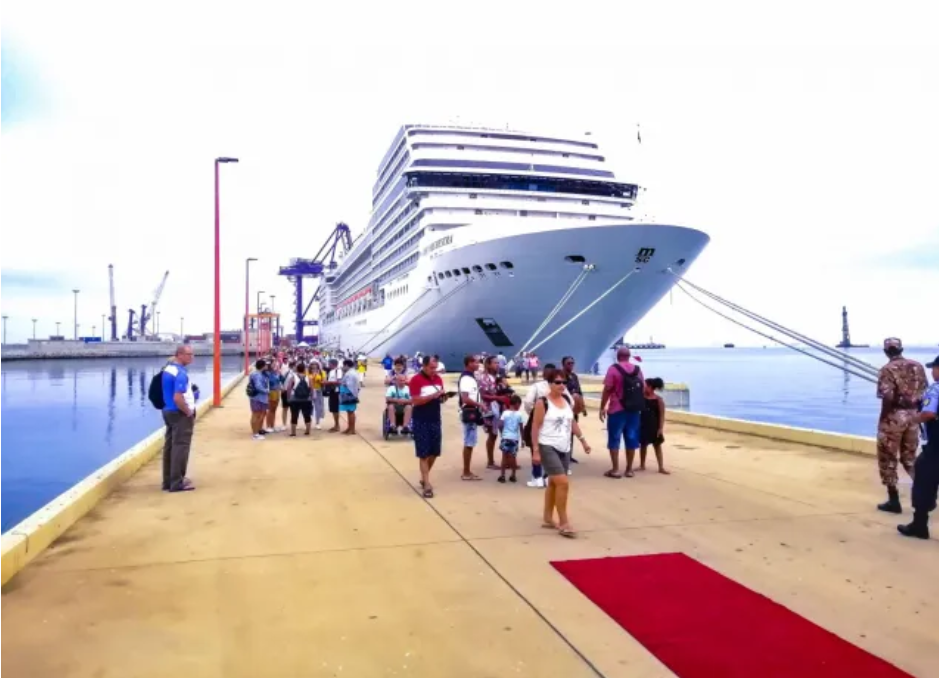
Namibia’s Ministry of Home Affairs, Immigration, Safety and Security has announced a major policy change, introducing visas upon arrival at Walvis Bay Harbour effective immediately. This strategic move is aimed at streamlining entry procedures, enhancing accessibility, and fostering economic growth through tourism and trade.
By issuing visas at the point of arrival, the Ministry seeks to bolster convenience for travellers while sustaining security measures. This initiative will simplify travel logistics for both tourists and business visitors, as it eliminates the need for prior visa applications.
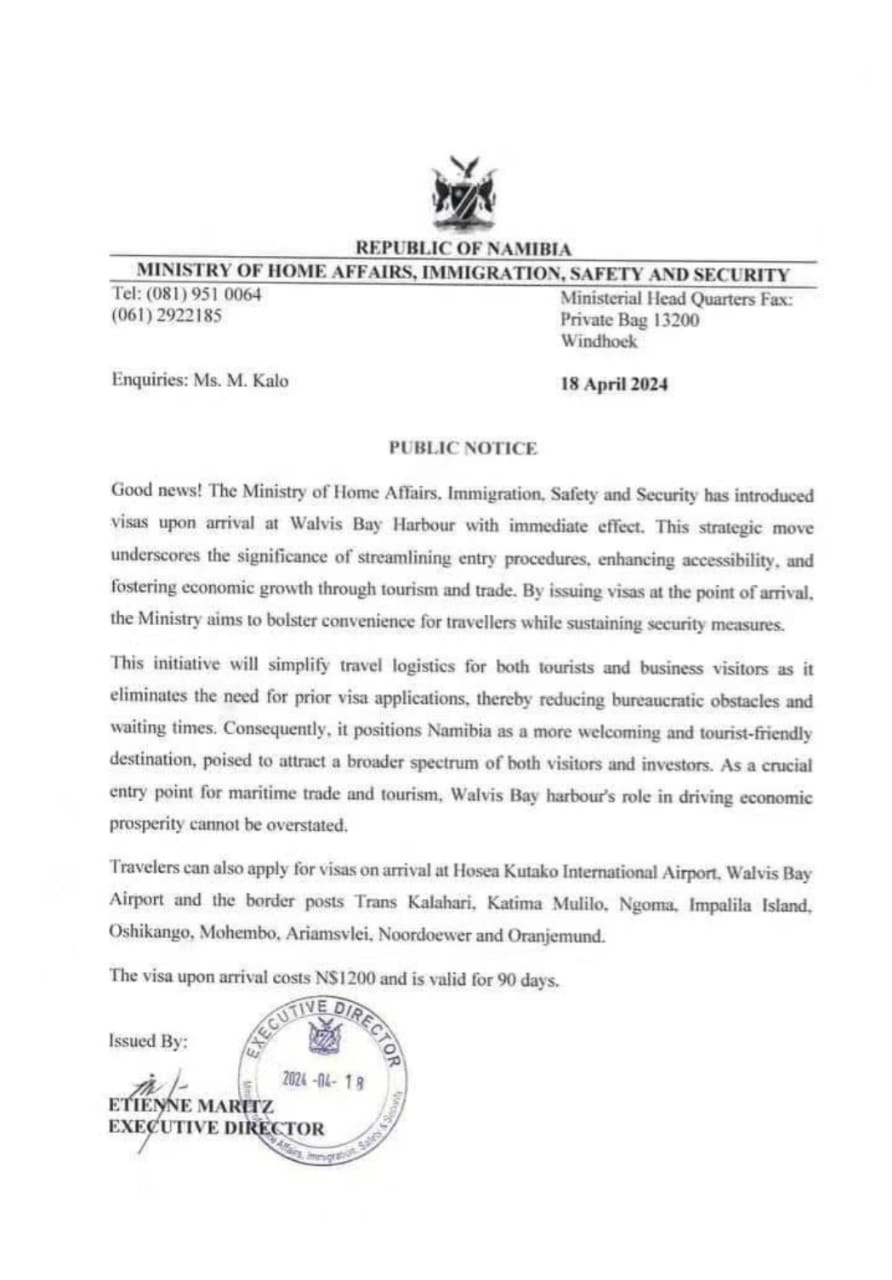
Source: Voyages Afriq
Featured on

- What is a visa?
- Electronic Visa (eVisa)
- Visa on Arrival
- Appointment Required Visa
- Invitation Letter
- Arrival Card
- Passport Renewal
- Project Kosmos: Meet the man with the world's most challenging travel schedule
- Australia Visa and ETA requirements for US citizens explained
- Brazil eVisa for US citizens
- India Tourist Visa for UK citizens
- Possible B1/B2 Visa questions during the interview
Select Your Language
- Nederlandse
- 中文 (Zhōngwén), 汉语, 漢語
Select Your Currency
- AED United Arab Emirates Dirham
- AFN Afghan Afghani
- ALL Albanian Lek
- AMD Armenian Dram
- ANG Netherlands Antillean Guilder
- AOA Angolan Kwanza
- ARS Argentine Peso
- AUD Australian Dollar
- AWG Aruban Florin
- AZN Azerbaijani Manat
- BAM Bosnia-Herzegovina Convertible Mark
- BBD Barbadian Dollar
- BDT Bangladeshi Taka
- BGN Bulgarian Lev
- BIF Burundian Franc
- BMD Bermudan Dollar
- BND Brunei Dollar
- BOB Bolivian Boliviano
- BRL Brazilian Real
- BSD Bahamian Dollar
- BWP Botswanan Pula
- BZD Belize Dollar
- CAD Canadian Dollar
- CDF Congolese Franc
- CHF Swiss Franc
- CLP Chilean Peso
- CNY Chinese Yuan
- COP Colombian Peso
- CRC Costa Rican Colón
- CVE Cape Verdean Escudo
- CZK Czech Republic Koruna
- DJF Djiboutian Franc
- DKK Danish Krone
- DOP Dominican Peso
- DZD Algerian Dinar
- EGP Egyptian Pound
- ETB Ethiopian Birr
- FJD Fijian Dollar
- FKP Falkland Islands Pound
- GBP British Pound Sterling
- GEL Georgian Lari
- GIP Gibraltar Pound
- GMD Gambian Dalasi
- GNF Guinean Franc
- GTQ Guatemalan Quetzal
- GYD Guyanaese Dollar
- HKD Hong Kong Dollar
- HNL Honduran Lempira
- HTG Haitian Gourde
- HUF Hungarian Forint
- IDR Indonesian Rupiah
- ILS Israeli New Sheqel
- INR Indian Rupee
- ISK Icelandic Króna
- JMD Jamaican Dollar
- JPY Japanese Yen
- KES Kenyan Shilling
- KGS Kyrgystani Som
- KHR Cambodian Riel
- KMF Comorian Franc
- KRW South Korean Won
- KYD Cayman Islands Dollar
- KZT Kazakhstani Tenge
- LAK Laotian Kip
- LBP Lebanese Pound
- LKR Sri Lankan Rupee
- LRD Liberian Dollar
- LSL Lesotho Loti
- MAD Moroccan Dirham
- MDL Moldovan Leu
- MGA Malagasy Ariary
- MKD Macedonian Denar
- MNT Mongolian Tugrik
- MOP Macanese Pataca
- MUR Mauritian Rupee
- MVR Maldivian Rufiyaa
- MWK Malawian Kwacha
- MXN Mexican Peso
- MYR Malaysian Ringgit
- MZN Mozambican Metical
- NAD Namibian Dollar
- NGN Nigerian Naira
- NIO Nicaraguan Córdoba
- NOK Norwegian Krone
- NPR Nepalese Rupee
- NZD New Zealand Dollar
- OMR Omani Rial
- PAB Panamanian Balboa
- PEN Peruvian Nuevo Sol
- PGK Papua New Guinean Kina
- PHP Philippine Peso
- PKR Pakistani Rupee
- PLN Polish Zloty
- PYG Paraguayan Guarani
- QAR Qatari Rial
- RON Romanian Leu
- RSD Serbian Dinar
- RUB Russian Ruble
- RWF Rwandan Franc
- SAR Saudi Riyal
- SBD Solomon Islands Dollar
- SCR Seychellois Rupee
- SEK Swedish Krona
- SGD Singapore Dollar
- SHP Saint Helena Pound
- SLL Sierra Leonean Leone
- SOS Somali Shilling
- SRD Surinamese Dollar
- SVC Salvadoran Colón
- SZL Swazi Lilangeni
- THB Thai Baht
- TJS Tajikistani Somoni
- TOP Tongan Pa anga
- TRY Turkish Lira
- TTD Trinidad and Tobago Dollar
- TWD New Taiwan Dollar
- TZS Tanzanian Shilling
- UAH Ukrainian Hryvnia
- UGX Ugandan Shilling
- USD United States Dollar
- UYU Uruguayan Peso
- UZS Uzbekistan Som
- VND Vietnamese Dong
- VUV Vanuatu Vatu
- WST Samoan Tala
- XAF CFA Franc BEAC
- XCD East Caribbean Dollar
- XOF CFA Franc BCEAO
- XPF CFP Franc
- YER Yemeni Rial
- ZAR South African Rand
- ZMW Zambian Kwacha
We've updated our app!
Download it now
Namibia Travel Guide: Requirements and tips for visiting Namibia in 2023
Welcome to namibia.
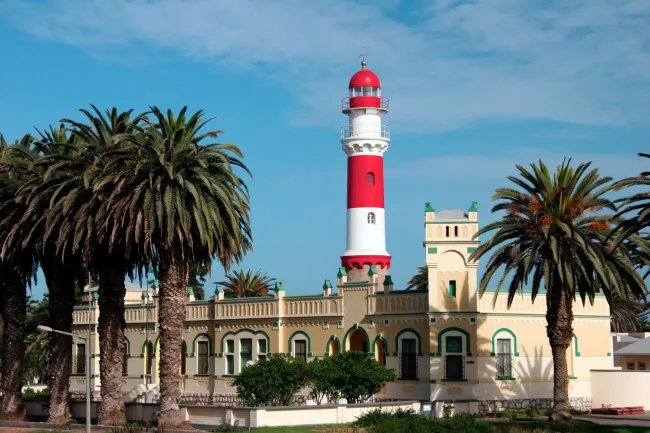
From desert landscapes to vast parks to spot wildlife, Namibia offers attractions to both families and adventurers. Enjoy a remarkable vacation while you step into this unique culture.
This ultimate Namibia travel guide will get you covered with inspiring tips and practical information for having a great trip.
Document checklist for Namibia
Valid passport (it must remain valid for at least six months from the date of entry and have two blank pages)
Sufficient funds to cover your trip
Return or onward ticket
Essential Namibia travel information
Currency - The official currency is the Namibian dollar (N$), but the South African Rand is also accepted in the country. $1 is equivalent to approx. N$18.60.
Daily budget for 1 person - Allow a daily budget of N$1,114 ($62).
Languages - The official language in Namibia is English, but only 3% of the population speaks it as a home language. German is also a national language and is spoken in some communities. Oshiwambo is the most common local language.
Number of travelers per year - In 2019, over 1.5 million travelers visited Namibia.
Socket type - Types D and M, 220V supply voltage and 50Hz.
Time zone - Central Africa Time (GMT+2).
Top 3 cities to visit - Swakopmund, Damaraland, and Walvis Bay.
Top 3 landmarks/monuments - Etosha National Park, Naukluft Mountains, and Sossusvlei National Park.
Visa information for Namibia
A good thing about visiting Namibia is that most tourists don’t need to apply for a visa in advance to enter the country. However, regardless of visa requirements, you’ll also need a Health Declaration .
Check the required travel documents in the Visa Checker Tool or keep reading to find out more.
The Namibia Health Declaration explained
The Namibia Health Questionnaire is a mandatory travel document that all visitors must submit before arrival. It is part of the new health measures implemented by the government. This document does not replace a visa. Obtain the Health form quickly and easily with iVisa, so you're prepared.
Visa difficulty index for Namibia
Accessibility: 5/5
Namibia is open to tourists! Most nationalities are visa-exempt or can easily obtain a visa on arrival. Get your Health Declaration quickly with iVisa.
Time to get your visa: 5/5
Most people don’t have to apply in advance for the Namibia Visa. However, you have to present the Health Declaration upon arrival. The best way is to fill it out in advance.
The visa fee depends on your nationality, and can be paid for upon arrival using credit or debit cards. The Health Declaration is free, you’ll only pay for the iVisa processing.
Typical costs and budget for Namibia
A guide to what you'll spend on a daily basis traveling through Namibia on a mid-range budget.
Daily spending - Around N$1,114 ($62) per person, per day. This includes:
Meals - Expect to spend about N$97 ($6) for a meal.
Transport - Depending on your travel plans and standard of travel, local transportation may cost up to N$200 ($11) per day.
Hotel - The average hotel price in Namibia for a couple is N$641 ($36).
On average, a trip to Namibia for two people for one week will cost around N$15,602 ($865).
Transport and best ways to travel around Namibia
Here are some Namibia travel tips about transport to get around Namibia . Learn below how to explore the country in the best way.
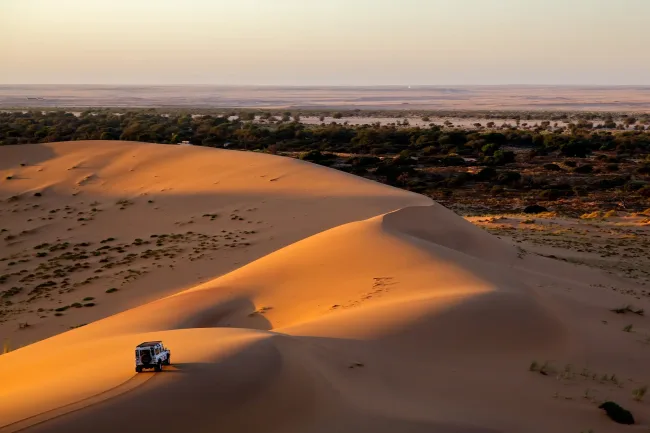
Flying to Namibia
Hosea Kutako International Airport is the primary international airport that serves the Namibian capital city of Windhoek. It serves as the primary hub for Air Namibia, but also many airlines cover this destination, such as:
Qatar Airways
British Airways
Ethiopia Airlines
Air Botswana
South African Airways
TAAG Angola Airlines
It’s also possible to take an international bus from Botswana or South Africa, although journeys are long and slow.
Arrival and immigration tips for Namibia
Arrival can always be a bit stressful after international flights. So here are some helpful tips to navigate
Namibia’s immigration procedures :
Most travelers have to obtain a visa on arrival at the airport. Ensure the correct visa and entry period are stamped in your passport, even if you're transiting.
Be aware that travelers have to present a valid yellow fever vaccination certificate to enter Namibia if they're arriving from a country where yellow fever occurs.
Make sure to pre-book your airport transfer through your accommodation or a reliable company.
Trains in Namibia
Trains can be an option to cover long distances traveling. TransNamib provides a comfortable overnight service connecting Windhoek to cities like Walvis Bay and Keetmanshoop. However, it’s not an extensive rail network, trains are slow , and schedules are occasionally unreliable.
Buses in Namibia
The bus is the best public transport for travelers on a low budget. They are affordable for long-distance trips, don’t have many stops, and are usually safe. Another option is taking shared minivans. These are the primary mode of transportation for Namibians and run between all major towns in the country when fully occupied.
Rental car in Namibia
The best way to discover Namibia is by enjoying a road trip with a rental car. The country boasts a reliable network of paved main roads and mostly well-kept gravel roads in remote areas. Renting a vehicle in Namibia is easy, and a mid-size car costs around $65/day.
However, rental agencies are often fully booked during the peak season (July to October), so making reservations is recommended. It’s also a great option if you plan to visit other African countries in the region.
Boat travel in Namibia
There are no large ferries in Namibia. Nevertheless, you can enjoy a boat tour from coastal cities like Lüderitz to Walvis Bay.
Safety in Namibia
Namibians are very welcoming, and you will most likely have a great experience there.
However, it’s necessary to exercise caution while visiting Namibia. Here are some recommendations:
Petty crimes such as pickpocketing, bag snatching, and car break-ins are common in Namibia. It's advisable not to leave valuables in your car and to keep vehicle doors locked and windows up, even while driving.
Violent crimes like muggings and robberies also occur, with tourists being robbed after stopping to help hitchhikers or strangers. Avoid walking alone in large towns, especially at night.
It's essential to be cautious when using taxis in Namibia. Unmarked taxis on the street are known to be operated by thieves. So, always use taxis with the Namibia Bus and Taxi Association logo or book taxis through your hotel or a taxi company.
Credit card skimming is also a prevalent issue. Keep your credit card in sight, and frequently monitor your statements for fraudulent transactions.
Flooding can occur during the rainy season (November to April), blocking roads. It's essential to monitor local media and follow authorities’ advice during these times.
Ensure you purchase travel insurance for this upcoming trip. This will give you access to medical treatment and cover medical emergencies if any misfortune happens.
Weather in Namibia
The best time to visit Namibia is during the winter months: June, July, and August. You can expect sunny days with cooler temperatures (sometimes even cold). A good travel tip is to pack an extra jumper, just in case.
Winter is also the dry season and the best period for game viewing since animals tend to gather around scarce water sources. Additionally, there's less chance of contracting malaria during this season.
On the other hand, if you want a completely different Namibian experience, the summer rains from November to April can transform parts of the country into lush green landscapes and may occasionally cause flooding in the desert.
Visit Namibia: Must do and see
There is so much to see in this country that making a Namibia itinerary might be challenging. Here are some amazing activities to do on your trip to Namibia :
Visit Etosha National Park . This is the largest game reserve in Namibia and is home to elephants, lions, zebras, impala, Thompson’s gazelles, and kudu.
Hike to the Fish River Canyon . It’s the second-largest canyon in the world and offers a magnificent view.
Take a catamaran cruise in Walvis Bay . This coastal town has diverse marine and birdlife and also beautiful landscapes.
Visit the Sossusvlei National Park’s dunes . These are some of the highest dunes in the world, and they have an impressive red color.
Stroll down Swakopmund’s streets . The town has German architecture and wonderful seafood restaurants.
Typical Namibian food to try
Don’t miss out on these typical dishes from Namibia:
Potjiekos - This popular South African/Namibian dish is a stew, typically made with meat, vegetables, and spices. The ingredients are simmered over a fire in a cast-iron pot, which gives the stew a smoky flavor.
Kapana - This grilled meat is popular street food in Namibia. It is usually made with beef but can also be game meat such as kudu or ostrich. The meat is grilled over an open flame, then cut into small pieces and served with chili sauce, onions, and sometimes tomatoes.
Mopane worms - If you want to try something exotic, this is it. These are a delicacy in Namibia and a good source of protein. To prepare the worms, they are first boiled or steamed and then fried with onions and spices.
Biltong - Biltong consists of dried meat, similar to jerky. It is typically made from beef or game meat and is marinated in vinegar and spices before being hung to dry. This typical Namibian snack is often served with beer.
Vaccine information for Namibia
Knowing the routine vaccines and COVID-19 measures required to enter Namibia before booking your trip is essential.
For example, the yellow fever vaccine is mandatory if you travel from a country where this disease occurs. We recommend you check the CDC website for more info about vaccine requirements and any recommended guidance.
Safari in Namibia
Namibia is a fantastic country to spot wild animals ! It’s one of Africa's safest and most diverse countries for safaris. You can include a day trip in your itinerary or stay a couple of days camping to explore the local parks.
The country boasts Africa's largest cheetah population and a significant number of black rhinos, leopards, and several endemic species. The country's breathtaking landscapes create a remarkable backdrop for wildlife safaris , and its excellent infrastructure makes it ideal for self-drive trips.
Etosha National Park is widely regarded as one of Africa's premier wildlife safari destinations . Visitors can witness enormous herds of lions, elephants, zebras, and antelopes, along with leopards, cheetahs, and black and white rhinos, around the numerous waterholes amidst some of Southern Africa's most stunning and photogenic safari landscapes.
Others recommend exploring the vast wilderness areas in the northwest of Namibia. In this region, you can track desert-adapted wildlife like rare black rhinos or desert elephants.
As you can see, you’ll make extraordinary memories in Namibia . Let’s pack and live this adventure!
Related Articles

Namibia visa policy: Uncover the Details

Namibia Vaccination Requirements | Do I need a vaccine to travel to Namibia?
1.2M happy customers
24/7 support
+46,000 reviews
10 years of experience
98% visa approval rate
- iVisa is NOT affiliated with any government agency. This site does not provide legal advice and we are not a law firm. None of our customer service representatives are lawyers and they also do not provide legal advice. We are a private, internet-based travel and immigration consultancy provider dedicated to helping individuals travel around the world. You may apply by yourself directly on the various government websites. The source of information: https://mha.gov.na/

- About The High Commission
- The High Commissioner
- Honarary Consuls
- Visa Fees and Exemptions
- Visa Application Form
- Visa Requirements
- Consular Forms
- Register With Us
- Walvis Bay Corridor
- Financial Environment
- Importing Vehicles
- Investment Opportunities
- Government Tenders
- Trade between the UK and Namibia
- National Parks
- Travel Tips
- Photography and Filming
- Action and Adventure
- Infrastructure
- Photo Gallery
- Video Gallery
- Namibian News Media
- Passing of President Dr Hage G. Geingob
- Chevening Scholarships are now open for application
- MIRCO - Implementation of Cabinet Decision (7th 23.05.23 008)
- STATE OF THE NATION ADDRESS BY HIS EXCELLENCY DR. HAGE G. GEINGOB, PRESIDENT OF THE REPUBLIC OF NAMIBIA
- Associate Communications Officer - Commonwealth Foundation
- Travel to England from another country during COVID-19
- Queen Elizabeth Scholarships
- Opportunity for Chevening Scholarships
- Vacancies at the Commonwealth

Visa requirements

visa requirements
The Consular Section assists nationals and residents of Greece, Malta, Ireland and the United Kingdom of Great Britain , respectively .
Visa Requirements for Foreigners Marrying Namibian Citizens
Within Namibia, all foreigners marrying citizens must present themselves to Immigration officials before the marriage is solemnized so that their visa/permits can be validated.
Site Search:
Location: 6 Chandos Street London, W1G 9LU Tel: +44 (0) 207636 6244 E-mail: [email protected]
Emergency contact: + 44 (0) 207636 6244
Opening Hours: Monday - Friday: 10:00 – 17:00
Consular Hours: Monday - Thursday: 10:00 – 12:00
Collection of passports & other documents: Monday - Friday: 15:00 – 16:00
Find us on social media:


Why Traveling Around Africa Is Difficult for Africans
I was scrolling on social media when a post caught my eye. Green Ranger Safaris , a travel company I'd never heard of, was organizing a road trip through seven African countries. This trip would start in Nairobi, Kenya, then head down into Tanzania, Malawi, Zambia, Zimbabwe, Namibia, and Botswana. The pricing was reasonable, so I paid a deposit, brushing aside concerns about both spending weeks on end with a group of strangers and the slight chance that the trip might have been an excellently worded scam.
A few months later, in August, I was on a truck with those strangers. It was late in the evening, and we swept through the Kalahari Desert in northern Botswana, the sun in the sky a flaming orb, the only visible life on the sand of the desert being the shrubs, the wild horses, and the herds of elephants. Music swirled from the truck's speakers, a mishmash of popular Kenyan songs from the turn of the century and Nigerian megahits. The countries we were traveling to had been chosen mostly because they were all English-speaking and provided visa-free travel to Kenyans, so the border crossings were simple, with clearances for the trucks, stamps for our passports and, in Botswana, disinfectant for our shoes.
Talk among the passengers was already turning toward doing similar trips in other parts of Africa. One suggested starting in Namibia, sweeping down along the coast into South Africa, moving through the megacities there, then traveling to Lesotho and Eswatini before entering Mozambique. Another pitched a West Africa trip. It all sounded exciting. Everything was possible. But then another passenger brought up Niger, where a coup had just led to the country's closure of its borders. What would happen if a person took a West Africa road trip and then there was a coup? Would the passenger have to stay there and never go home? We laughed at the absurdity. But behind the laughter was real heartache. Because the reality is that any African traveler has thought about the difficulty of traveling as an African.
My mother was a traveler, and when she traveled for work, my brothers and I would travel in Kenya with her. Then, when I was older, the expanse of my travel grew larger: First I traveled around Kenya, then around East Africa. Now I have a desire to explore the continent, to explore versions of myself in other countries in Africa, home to some of the most humbling and impressive landscapes and vistas in the world: to the largest freestanding mountain on earth (Kilimanjaro); to the largest hot desert in the world (Sahara); to thundering waterfalls twice as wide and deep as Niagara (Victoria); to sparkling white-sand beaches; to UNESCO-listed nature reserves; to cities whose histories stretch back through millennia; and to award-winning wine regions. But I find myself marooned before the bank of difficulties other African travelers face.
A few months after my Green Ranger trip, I spoke to Anneli Douglas, an academic at the University of Pretoria in South Africa who has studied travel in Africa. She pointed out how much easier it is for Western visitors to get visas for Africa than it is for African travelers to visit their countries. "Sometimes, travelers have to travel long distances to apply for a visa, or there might not even be representation of the destination country in the home country, making it difficult to obtain a visa at all," she says. "Also, for Western countries, the cost to obtain a visa to Africa is much cheaper than what it is for Africans-considering the value of the local currency."
In places like Kenya, African destinations are rarely marketed to would-be travelers. Instead, there is a surfeit of packages offering holiday trips in destinations like Dubai, Bangkok, and Istanbul, because it is not only easier but also often cheaper to organize trips to these places than it is to organize trips within the continent. Even when visas are relatively easily attainable, travel from one African country to another is rife with difficulties. Sam Maundu, a Nairobi-based tour operator who runs Rosolo Safaris , which organizes trips around Africa, had no shortage of factors ready when I asked what these difficulties are: "Language barriers, visa restrictions, expensive flights, African destinations not targeting Africans to visit, long distances to be covered either by road or by flight since there are often no direct flights, security situations in some places, perception that there is nothing to see in other African countries, harassment by border officials."
One of the lingering effects of colonialism on the continent is that interaction between African countries tends to exist along mostly colonial lines: There are the former Portuguese colonies, the former British colonies, the former French colonies. Passport holders from Kenya, which was colonized by Britain, are mostly able to go to former British colonies visa-free or with visa-on-arrival status. This means that for a person planning a trip, it becomes easier to think of traveling to these countries. On our multiple-country road trip, the travelers were mostly holders of Kenyan and Ugandan passports (Uganda, another former British colony), and so the countries that the trucks went to were all-except for Namibia-former vestiges of the British Empire. This shared history meant also that because all these countries have English as an official language, it would be relatively easy for us travelers to communicate with people there.
Samuel Agblorti is a lecturer at the Centre for Mixed Migration and Diaspora Studies of the University of Cape Coast in Ghana. I ask him about about a hypothetical trip from Cameroon to Senegal, across a region where multiple coups have happened in recent years. Safety concerns rising from these events had further entrenched visa restrictions across Africa. "Because our borders aren't very well protected, there is a fear that allowing too many visitors will make it unsafe," Agblorti tells me. But even getting those visitors has been a problem.
In 2016, the African Union announced plans for an AU passport to be rolled out by 2020. This passport would open travel across the continent, as more African citizens wouldn't need visas to travel to other African countries. However, more than seven years later, the passport hasn't been launched, stymied by a mixture of security concerns and protectionist attitudes among African states. (The AU remains silent on when and if the passport will be launched.) Still, Agblorti says such a passport would not necessarily be the panacea that its supporters think it would be as it wouldn't automatically lead to visa-free travel without individual states implementing it. He gave the example of regional blocs such as the Economic Community of West African States (ECOWAS), whose membership comprises 15 West African states whose citizens hold ECOWAS passports. "Even within ECOWAS, there are protocols that member countries are supposed to adhere to, but some of them don't," he says. "You may have a common passport, but if the countries don't make extra commitments, then it doesn't matter."
Thus far, only a handful of African countries have committed to allowing African visitors to visit without a visa: Gambia, Benin, and Seychelles; Rwanda has announced plans to implement this. On a small scale, then, African visitors to these countries will experience the promise of the AU passport-if it does indeed come to fruition.
Most recently, in December 2023, rather than introduce the visa-free status its president had promised , Kenya announced that it would require an electronic travel authorization (ETA) , to increase revenue from visitors seeking to enter Kenya. Visa-free entry was scrapped for all but five other East African countries, and new travel requirements and fees were introduced for countries whose citizens had previously enjoyed visa-free travel into Kenya. To some, the doors of entry-rather than being flung open-were being closed even tighter.
Another issue is how expensive it is to travel in Africa. According to a 2013 World Bank report , airfare within Africa is roughly 50 percent more expensive than airfare in comparable locations worldwide. Flights from one African country to the other tend to be much more expensive than flights from Africa to Europe and Asia, despite logic that the shorter the distance, the cheaper the flight ought to be. This means, in effect, that a traveler from Kampala, Uganda, would find it more affordable, and therefore more attractive, to fly to Dubai than to Maputo, Mozambique, despite the latter being much closer than the UAE.
Tour operator Maundu told me that this makes it difficult for him to suggest to his clients travel packages that involve other African destinations: Often, it means the cost of the round-trip air tickets more than doubles the cost of the entire travel package. And there aren't always reliable road or rail options that offer alternative transport to travelers. Most leisure travelers can't move directly by rail from Kenya to South Africa (there is a luxury train network between Tanzania and South Africa that costs $19,000), while in most other regions of the continent, not only are there no multicountry rail options, but also existing bus networks rely on terrible roads.
The irregularity or non-availability of intra-regional air connections and of internal air transport also constrains access to internal destinations and prevents progress with multicountry tourism packages, Maundu says. Also, tax rates per passenger in Africa are more expensive than they are on other continents: The total tax per passenger is about $64, compared to $30.23 in Europe and $29.65 in the Middle East. This is exacerbated by the lack of a single unified aviation market, whose absence means that fares and tax rates swing with volatility across different parts of the continent.
Rather than negotiate with one central body, airlines operating in Africa deal with individual countries, which each usually have different rates and requirements for entry. In Europe, for instance, the establishment of the European Common Aviation Area (ECAA) in 2006 decreased airfares across Europe by making possible the rise of a fleet of low-cost airlines, and at the same time increased the volume of flights within European airports. In this vein, there have been attempts to establish a single aviation market in Africa. The most recent of these attempts is the Single African Air Transport Market (SAATM). Announced in 2018 , the SAATM so far has signed on 34 countries. However, like the AU passport before it, the SAATM has not been implemented, and so it remains nothing but an idea.
In the meantime, African travelers continue to dream. Travel plans continue to be made. Potential destinations continue to be talked about. At the end of our seven-country road trip, as we headed back to Kenya, we spoke again about organizing future trips together, our group of strangers now bonded as friends. Some people discussed taking a trip to Uganda over the next month. Others talked about heading across the Indian Ocean to Mauritius. In Lusaka, Zambia, where the first batch of travelers would leave us to fly back to Nairobi, weepy goodbyes were made. "We are family," one of them said.
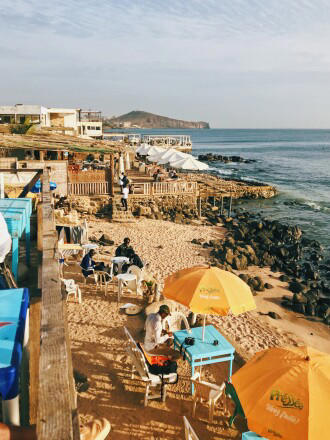
We’re sorry, this site is currently experiencing technical difficulties. Please try again in a few moments. Exception: request blocked
- City Fajr Shuruq Duhr Asr Magrib Isha
- Dubai 04:18 05:38 12:19 15:45 18:54 20:13

- Economy and Finance
- Gold and Currency
- Stock Market
- Real Estate
Entry Requirements for UAE in 2024: Visa or Permit Needed?

Wondering about the entry requirements for the United Arab Emirates (UAE)? Here's what you need to know to plan your visit according to the UAE governmental 2024 update
GCC citizens do not need a visa to enter the UAE. Some of the other nationalities can obtain a visa on arrival while others need to apply for a visa in advance. Find out if you need a visa to enter the UAE.
Visa-free entry
Citizens of GCC countries do not require a visa or permit or to be sponsored by a national or resident in the UAE. They need to produce their GCC country passport or national ID card at the point of entry into the UAE.
Visa on arrival
30-day visa on arrival.
Citizens of these countries do not require advance visa arrangements to enter the UAE and can obtain a visa upon arrival for 30 days with a 10-day grace period for extension.
- Hong Kong SAR China
- Macau SAR China
- New Zealand
- United Kingdom
- United States
- Vatican City
90-day visa on arrival
Citizens of these countries do not require advance visa arrangements to enter the UAE and can obtain a visa upon arrival for 90 days:
- Czech Republic (Czechia)
- El Salvador
- Liechtenstein
- Netherlands
- Solomon Islands
- South Korea (Republic of)
- Saint Vincent and the Grenadines
- Switzerland
Pre-arranged entry permits
Anyone who does not have the privilege of getting a visa-free entry or a visa on arrival will require an entry permit prior to arrival into the UAE and someone to sponsor it.
- Afghanistan
- Antigua & Barbuda
- Bosnia & Herzegovina
- Burkina Faso
- Cayman Islands
- Central African Republic
- Dominican Republic
- Democratic Republic of the Congo
- Equatorial Guinea
- Guinea-Bissau
- Ivory Coast
- North Macedonia
- Marshall Islands
- Myanmar (Burma)
- Papua New Guinea
- Philippines
- Republic of the Congo
- São Tomé and Príncipe
- Sierra Leone
- South Africa
- South Sudan
- Saint Kitts & Nevis
- Saint Lucia
- Taiwan, Republic of China
- Timor-Leste (East Timor)
- Trinidad & Tobago
- Republic of Turkey
- Turkmenistan
- Turks & Caicos Islands
Requirements for an entry permit
These are the requirements for an entry permit:
- an Emirati citizen
- an expatriate resident with valid residency permit in the UAE
- a UAE-based airline
- a UAE-based hotel or tour agent
- a government entity
- companies in the private sector or free zones.
- Prospective visitors seeking entry permits are required to have a genuine passport, valid for at least six months.
- A visa ban prohibits a person from entering the country or taking up a new job. Prospective visitors must not have been deported or be banned from entering the UAE in which case, he needs to obtain special permission to re-enter.
Illegal to work on a visit or tourist visa
Visitors and tourists should be aware that it is illegal to work in the UAE with or without pay while being on a visit or tourist visa. According to the UAE's labour and residency laws, a person cannot work if he has not been issued a work permit and an employment visa. Violators may be liable to fines and deportation.
Source: Al-Bayan newspaper

IMAGES
COMMENTS
Visa & Entry Requirements All visitors to Namibia must have a valid passport for at least six months after the date of entry, and have sufficient pages for entry and exit stamps (at least three blank pages for the entry and exit stamps). ... Travellers to Namibia can travel with mobile equipment and access the GSM network at all towns and on ...
Call us in Washington, D.C. at 1-888-407-4747 (toll-free in the United States and Canada) or 1-202-501-4444 (from all other countries) from 8:00 a.m. to 8:00 p.m., Eastern Standard Time, Monday through Friday (except U.S. federal holidays). See the State Department's travel website for the Worldwide Caution and Travel Advisories.
Visa applications should be submitted between 09:00 and 11:00 am and pick up is 3:00-4:00 pm. All visas are processed around the date the application forms are received and will be valid for 3 months. Do not apply for the visa more than 3 months in advance of the planned travel date.
Visas: A visa is not required for U.S. passport holders who plan to visit Namibia for tourism or informal business meetings for fewer than 90 days per calendar year. Travelers coming for study or work in any capacity - even if the work is unpaid or voluntary - must obtain appropriate study/work permits prior to entering Namibia.
Namibia is a fun family travel destination. If you are traveling with children under 18, you must carry a certified copy of each child's original birth certificate. If children are traveling with only one parent, you'll also need to have certified consent from the other parent or proof of sole custody. Families with adopted children should ...
FCDO travel advice for Namibia. Includes safety and security, insurance, entry requirements and legal differences. ... Visa requirements. You can visit Namibia for up to 90 days without a visa. If ...
All visitors travelling to Namibia for business purposes, including doing volunteer work, require a visa, which must be applied before entering Namibia. Visa Note. Nationals not referred to in the chart are advised to contact the nearest high commission/embassy for visa requirements for Namibia.
The Government of Namibia allows citizens of specific countries and territories to travel to Namibia for tourism, visiting friends and relatives as well as official purposes for 3 months with an ordinary, diplomatic and service passports without having to obtain a visa. All visitors must have a passport valid for at least 6 months. Namibia announced the start of issuing African passport ...
Namibia is a beautiful country worth visiting. The country is known for its beautiful places and its unique culture. Foreigners who want to visit the incredible country of Namibia and need to know more about the visa policy, requirements, duration, visa types and processing time can read the article below. Who Needs a Visa for […]
For many nationalities it is possible to obtain the visa on arrival at the airport against a visa fee. To enter Namibia, you need a passport that is valid for at least another 6 months and has at least 3 blank pages. If you travel with children, in many cases you need to provide their birth certificates.
Namibia Visa free usually has short stay with a period of 3 months. Applicant is required to be present. 2. Visa on Arrival. Namibia Visa on arrival stay is usually short. Applicant is not required to be present when applying for visa. 3. Tourist visa. Namibia Tourist visa stay is usually short.
Find continuously updated travel restrictions for Namibia such as border, vaccination, COVID-19 testing, and quarantine requirements.
Before you travel, check with your transportation company about passport requirements. Its rules on passport validity may be more stringent than the country's entry rules. Regular Canadian passport. Your passport must be valid for a minimum of 6 months after the date you enter Namibia. Passport for official travel. Different entry rules may ...
Republic of Namibia is a country in the Southern Africa. Its total area is about 825.6K km 2, population — more than 2.5M. The table shows the visa requirements for citizens of foreign countries who wishes to enter the Namibia.
Living in Namibia. Travelling to Namibia. FCDO travel advice for Namibia. Includes safety and security, insurance, entry requirements and legal differences.
Documents Required For Namibia Visa. According to the official Namibia visa application requirements, below is a list of documents, which you need to keep in hand, before applying for a Namibia Visa. A passport must be valid for at least six months, Confirmed air-tickets. Proof of accommodation such hotel bookings.
Visa Requirements. To enter Namibia a passport valid for at least 6 months from date of entry is required. Kindly ensure that you have at least 3 blank pages for entry and exit stamps. A valid return ticket is also required. Entry into Namibia will be allowed up to a maximum of 90 days. Extensions can however be applied for from the Ministry of ...
Travel medical or health insurance. Proof of substantial funds for the duration of stay in Namibia, (3 months bank statement / bank guarantee) Payment confirmation for a visa. Documentation detailing the purpose and duration of the visit. Copy of a yellow fever vaccination certificate where applicable.
If your travel plans in Namibia include outdoor activities, take these steps to stay safe and healthy during your trip. Stay alert to changing weather conditions and adjust your plans if conditions become unsafe. Prepare for activities by wearing the right clothes and packing protective items, such as bug spray, sunscreen, and a basic first aid ...
Check your visa before leaving the immigration counter. You may be detained or fined if you don't follow visa or immigration requirements. Border measures. You need a valid yellow fever vaccination certificate to enter Namibia if you're arriving from a country where yellow fever occurs. More information: Countries with a risk of yellow fever
Foreign nationals exempted from visa requirements when traveling to Namibia for a maximum period of 90 days per year. Nationals from the countries listed below with whom Namibia has Visa Exemption Agreements are not required to obtain visa and will be allowed to enter into Namibia and get Visitor´s Entry Permit (VEP) endorsement stamps at the Port of entry for the following reasons:
Namibia introduces visa on arrival at Walvis Bay Harbour. Namibia's Ministry of Home Affairs, Immigration, Safety and Security has announced a major policy change, introducing visas upon arrival at Walvis Bay Harbour effective immediately. ... ATTA® - The African Travel & Tourism Association Matrix Studios, 91 Peterborough Road, London SW6 ...
Visa information for Namibia. A good thing about visiting Namibia is that most tourists don't need to apply for a visa in advance to enter the country. However, regardless of visa requirements, you'll also need a Health Declaration. Check the required travel documents in the Visa Checker Tool or keep reading to find out more.
visa requirements. The Consular Section assists nationals and residents of Greece, Malta, Ireland and the United Kingdom of Great Britain, respectively. Passport (Original). The passport must have at least Six (6) months validity from the intended date of return (date you plan to leave Namibia) and at least Three (3) or more blank pages;
To travel around Africa, African passport holders have to contend with visa restrictions, long distances, language barriers, and costly flights from one country to another.
The #DV2025 Diversity Visa Program will be open for registration from October 4 to November 7, 2023. This program allows people from countries with low U.S. immigration rates, who meet eligibility requirements, to register for a chance to apply for a U.S. immigrant visa. https://dvprogram.state.gov, is the ONLY way to enter.
<link rel="stylesheet" href="styles.a7665c217b9113ef.css">
Citizens of these countries do not require advance visa arrangements to enter the UAE and can obtain a visa upon arrival for 30 days with a 10-day grace period for extension. Brunei Canada